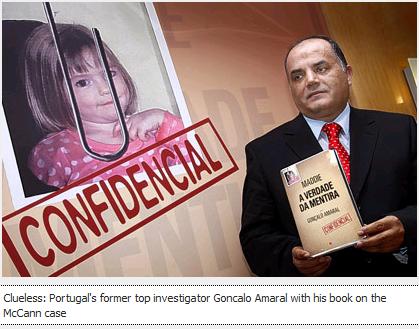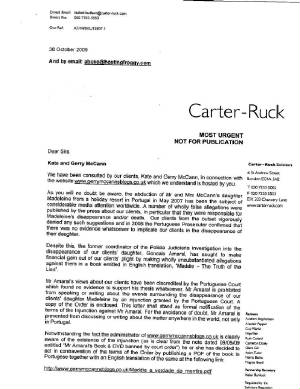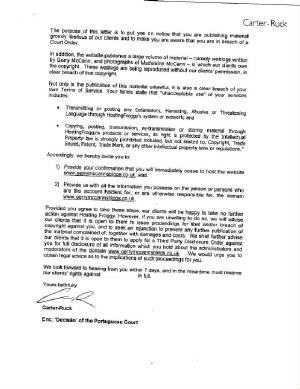Heading for Rothley, 29 January 2010 |
|
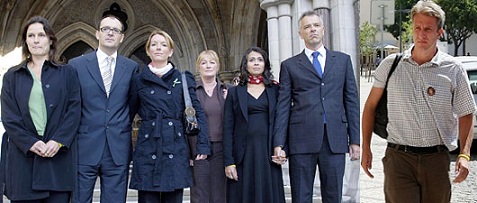
Friday, 29 January 2010
On the very first page of this
blog, we asserted that the McCanns had lied about the case from beginning to end. Perhaps readers thought, oh this is
blogland, people make all sorts of claims.
No. We repeat, and it is a matter of record, that Kate & Gerry
McCann lied from beginning to end of the investigation into their daughter's disappearance, a claim that will stand up
in the libel courts because it is undeniably true.
It began, as we said, with the parents failing to tell the police
the truth in their very first interviews. As the case prosecutor, Mr. Menezes, stated in court, in Lisbon, this month: "the
couple lied to police about how long they had left Madeleine alone."
And it ended with the McCanns claiming
through their spokesperson that the final report from that same Mr. Menezes concluding the case in August 2008, "cleared"
them. That was also a lie, not a misunderstanding, one which they later embellished by claiming that "the courts"
had cleared them. Nowhere does the report clear them.
Now, this is not just a problem for Kate & Gerry McCann.
It is a very real problem for their friends, the so-called Tapas 7. Why? Because most members of the group confirmed in their
own statements the accuracy of what the couple had told the police. And they did not do so by accident, nor by hearsay.
Hearsay? No, couldn't be. They unequivocally confirmed the parents' claims from their own observation
of who did what when they all shared a meal in the so-called Tapas bar that night.
Accidental misinformation?
How could it be? We know that they discussed the claims of who checked whom on the night of May 3/4 and then wrote down what
they had agreed, on two separate pieces of paper which the police seized. A few days later, and before their second police
interviews, the group produced a third, fully detailed, printed document again confirming that the parents had checked the
children at the times they said they had. The times which Mr. Menezes, with the benefits of the investigation papers behind
him, states are lies.
It is worth remembering what a witness statement is designed to do. As a UK legal guidance
document puts it, in plain language:
"In general a witness statement should only contain information on
what the witness saw, and not what others have said to him/her."
The reason for this is simple: if everyone
sticks to a frank description of what they themselves, and nobody else, did and saw then the statements can be compared to
build up a picture of the truth. If, however, witnesses discuss what others have done, or if they describe what
others are supposed to have done, the statements actually obstruct a picture of events emerging.
The
May 4 statements of the McCanns are not only untrue but they present a devastating breach of witness good practice. From the
start both of them describe what others were doing that night when out of their sight, i.e information that they could not
possibly have known was true, but which fits in with their own version of events. And, equally damning, even though the statements
were taken independently, they use almost exactly the same words for long passages: they have clearly discussed and agreed
and memorized what they are going to say.
It would take months of police work to unravel the mixture of confusion,
untruth, and collusion which these statements by the group provided, information, it's worth reminding ourselves, which
was vital for the effort to trace the child during the first forty eight hours. When they had done so – and after Mr
Amaral the "discredited cop" was removed from the case - they pinpointed the areas of inconsistency in the statements
and decided that only by making these witnesses actually repeat their supposed movements that night – the so-called
reconstruction – could the confusion be clarified.
So much for the claims, repeated again recently, that
the case against the parents was "old stuff", an absurd idee fixe of Goncalo Amaral and his few colleagues
in the early days of the case. On the contrary it was the new team led by Amaral's successor Rebelo who put the whole
process of trying to get the truth out of the nine into action: if, as it appeared, the parents' version of their movements
that night was untrue and the other seven had confirmed that version, then the investigation could go nowhere until the inconsistencies
were confronted.
And then? It was certainly not impossible that the inconsistencies would be ironed out and the
credibility of the witness statements strengthened – in which case all nine probably would have been "cleared"
- genuinely cleared - of suspicion. That in turn would certainly have led to a re-focusing of the case onto different lines
of investigation.
Why should anyone object to such an idea? And what did the Tapas 7 think about it?
|
Fugitives 'R' Us, 05 February 2010 |
|
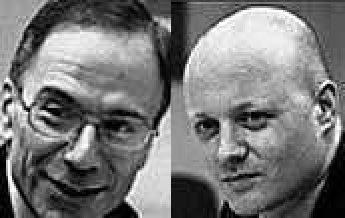
Wednesday, 05 February 2010
After the hastily
scribbled "Let's dismember Noddy" timelines the group subsequently sat down and created what they called
a "collective recollection" of events. Written over the weekend of the disappearance - how did they find the time?
- this was an expansion of the hand-written notes into a three page printed document, now including a lengthy description
of Jane Tanner's fleeing stranger, though quite how a "collective document" could assist a sole witness, rather
than unintentionally corrupting her evidence, was not made clear.
Nothing, indeed, has ever been clear about this
document except the bafflement it induced in the Portuguese police. Didn't professional people like them understand that
it was a complete corruption of the statement process? Apparently not. Couldn't they see that it looked like another attempt
at a unified story, as well as breaching the secrecy guidelines? Nope. Basically we wrote it to help you, said the
group. Help us? You think this helps us? Police bemusement was complete when, having handed the thing around
to British embassy staff as if it were the latest Big Issue, those who were being re-questioned on May 10 asked if
they could take their own copies into the interview room to help answer the questions!
Soon after these interviews,
one of which featured Jane Tanner giving her remarkable lecture on the well-known British tradition of leaving infants alone
in hotel rooms, those of the seven who wished to leave for England were free to do so. According to the spokesman Clarence
Mitchell they did not meet again as a group until the strange and shadowy Rothley meeting in late November. The days of openly
working together on their version of what happened on the holiday were over.
The soap-opera Search for Maddie,
that "fairy-story" as the ex-police officer Marita Flores described it in a Lisbon court, ran for almost three more
months to huge viewing figures and rave reviews until it was taken off in early September when the leading man and lady were
removed from the stage and named, to audience uproar, as arguidos. Following their hasty exit to the UK the two stars now
had to concentrate on the altogether less glamorous business of clearing themselves. Those, however, who thought that the
parents, once away from the hysterical rumour mill of the Portuguese press, would dismiss the "ludicrous" claims
against them with ease by calmly and simply putting forward the facts that demonstrated their innocence, were in for a shock.
That was not to be their strategy at all.
With their new-found financial resources the parents engaged two of the
most skilled and expensive lawyers in London. One, Gerald Caplan QC, was a specialist in saving people from extradition, however
strong the evidence against them appeared to be. He was the saviour, if that is the right word, of Chile's ex-dictator
General Pinochet, who had begun his political career with the slaughter of his democratically elected predecessor and continued
it with his "expunging" of political opponents by killing them on a truly South American scale.
Pinochet,
having been arrested in England at the behest of a Spanish lawyer, first stalled and then thwarted extradition to that country.
Since, so we were informed, the aged General was suddenly suffering from advanced Alzheimer's' disease and was hardly
able to function, let alone plan a defence, the credit for his escape must be all Caplan's. Unable to claim that Pinochet
wasn't a killer - the evidence against him was far too strong - the lawyer claimed the Spanish weren't legally entitled
to seize his tottering client. Eventually, after months of house arrest, the wizened old killer flew back to Santiago, there
to add to his fame as the first man in history to make a complete recovery from Alzheimer's.
The other selected
lawyer was a Mr Angus McBride, a high whizz at – what? Helping innocents abroad? No, not exactly. Wrongful
arrest cases? Miscarriages of justice? Not those either. The very, very expensive McBride specialises in "repairing
high-profile reputations" and dealing with the media. Famous actor caught with kiddy porn, career facing ruin? Angus
is your man. Famous footballer with a penchant for violence and adultery? Send for Angus, he'll clean you up so you keep
your earning power. Knows how to use the media, you know, there's nobody to touch him.
For two innocent people,
victims of a ghastly misunderstanding who just wanted the police to find their child, these were very strange choices indeed.
Unlike the Red Hot Chile Killer they were claiming innocence and totally clean hands, not legal technicalities in their defence.
Unlike Mr John Terry, the footballer, they had no history of criminality and therefore no need of a defence strategy more
suited to a fugitive Mafia boss than the innocent victims of a family tragedy. And quite how a celebrity reputation repairer
could help free two innocent provincial doctors to return to Portugal and carry on with the search for their child seems something
of a mystery. All very weird.
Nevertheless that was their choice. Returning voluntarily to co-operate with the
police was out of the window. Using the so-called "twin-track" strategy that the other lawyer, Ed "expunge
it" Smethurst, so helpfully described, Caplan and his staff would explore the strength of the case against them,
highlight their vulnerabilities, counter the police evidence and, in effect, challenge the Portuguese to come and get them
via the extradition process.
At the same time, on the other track, McBride would use the media via the pliant Clarence
Mitchell to maintain or rebuild public confidence in the pair, using the full battery of leaks, documentaries, selected interviews
and all the other black arts of news management to ensure that, even if the Portuguese case was strong enough legally to push
the pair into a plane, public opinion would intimidate the Home Office into raising the bar.
It was very clever,
very professional and very pricey. As for the vulnerabilities in their version of events, some of which involved members of
the Tapas 7 too, they had to be tackled. What to do?
|
Wednesday the 10th, 08 February 2010 |
|

Monday, 08 February 2010, 05:38
We had planned
to bring our own "twin tracks" – current events and the background to the case – together by this Wednesday
but the skeletons are still being shovelled out of the Team McCann cupboard, so not quite. Still, it's unlikely that there'll
be a verdict then so perhaps we'll have convergence by judgement day.
Gradually the issues at the heart of
the case, which are bigger than Gonçalo Amaral or any other individual, have become clearer. They will remain, like
unhealed wounds, until one day, somewhere, a full libel case reaches the courts.
Until then we have the present
hearing.
The McCanns' legal team have claimed that Amaral's theory of death in 5A reflects only his own
false assumptions. Looking at the investigation as a whole, says the lawyer Duarte, rather than merely the early stages before
Amaral was removed, his conclusions are clearly not justified by the investigation evidence. Therefore his repetition of the
claim is an outrageous libel and a breach of their rights under Portuguese law.
How to decide the truth? The evidence
lies, of course, in the case papers. But to go through them, and the required witness clarifications, would amount to a full-scale
trial covering months. The McCanns' case is that even if this were practical – and the costs would be colossal -
such an effort would take too long: the damage caused by Amaral's "thesis" has to be addressed as a matter of
urgency.
They claimed, therefore, that the key evidence should be the famous archiving dispatch by the prosecutors,
a short-cut which can be taken as a factual and unarguable summary of the entire investigation. The relevant passages concern,
firstly, "the absence of evidence for any involvement of the parents in a serious crime", which, states
the document, "seems to result from the objective circumstances of them not being inside the apartment when she disappeared
and from their normal behaviour until the disappearance and afterwards.”.
And, secondly, there is the
conclusion: that the entire investigation had produced no evidence at all to formulate any intelligible theory as to what
had happened and no evidence to decide whether the child is alive or dead.
Thus, the parents claim, and have
claimed repeatedly, the authoritative summary of the whole investigation does not support Amaral's claim that the child
is definitely dead and, as a matter of simple fact, "clears" them. Judgement should, therefore, be given against
Amaral and the handcuffs of the injunction remain in place.
On the other side lies the fact that the report explicitly
refuses to "clear" them. In a long section on the vexed question of the inconsistencies in the Tapas 9's
version of events, and the need for a reconstruction of their movements to clarify them, it says quite clearly that after
all nine were requested to attend, "nevertheless, despite national authorities taking all measures to render their
trip to Portugal viable and after the many doubts that they raised about the necessity and opportunity of their trip were
clarified several times, they chose not to attend, for unknown motives, which rendered the [attempted reconstruction ] impractical."
"We believe," adds the report, "that the main damage was caused to the McCann arguidos, who
lost the possibility to prove what they have protested since they were made arguidos: their innocence regarding the fateful
event. The investigation was also disturbed, because these facts remain to be clarified."
So that is
what this judge, and no doubt future judges, will have to confront.
So far two of the McCann claims have been shown
to be untrue and go out of the window, unless the judge is both deaf and blind. Factually, there is no "clearance"
for the parents in the report, and therefore in the investigation. Secondly the belief in "the involvement" of the
McCanns was not Amaral's alone but that of the whole investigative team, as the police testified. A third claim that the
document does not support Amaral's belief that the child is dead is true. The prosecutors say that the chances are 50/50
and one of them repeated it in court.
But they say that on the basis of an incomplete, or as the prosecutors
describe it, a "disturbed", not just archived, investigation. The very people seeking the protection of the
Portuguese justice system refused to co-operate with that system when the investigation took place and, absurdly, remain beyond
its reach while sitting in the courtroom! Leaving this conflict of rights and responsibilities aside, one question for the
judge immediately arises: if they and the seven other key witnesses had agreed to co-operate would the report still say the
same things?
No. Purely as a matter of fact it cannot. The entire reconstruction section is out. The claim that
the parents lost their chance to show their innocence is out. And the conclusions arising from their questioning would have
to be incorporated into the investigation and therefore the summary's conclusions would have to take a different form,
one way or the other.
Would the chances of the child still be, like Schrodinger's cat, an undecidable 50/50?
We don't know, because the people claiming the protection of the law will not let us know, even though they were free
to do so. So the claim that the archiving summary decides matters of fact and can be used as a short-cut in place
of the full investigation record is very moot indeed.
Nor was it acceptable to this judge, although it had been
to the semi-secret and hurried second hearing now under appeal. An appeal court could hardly accept as an ultimate factual
record a document that one of the parties had influenced by their refusal to return to Portugal. Against the objections of
their lawyers the full record of the case on DVD was admitted in evidence. As a result the summary itself, and the circumstances
that produced it,can now be assessed as part of the judgement process.
Those are the points that the judge will
have to decide on. And more judges in the future. It looks like the lawyers are going to be raking it in for a very long time
to come.
|
Winning his spurs, 08 February 2010 |
|
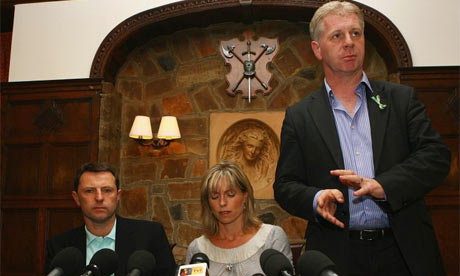
Wednesday, 05 February 2010, 12:12
The clouds of
smoke and misinformation that hang over the efforts of Kate and Gerry McCann to avoid justice in Portugal in the Autumn of
2007 have yet to disperse. The first casualty of the switch from "The Fairy Story" to the deadly serious business
of defending themselves was the removal of Justine McGuiness. M/S McGuiness was a slick enough PR person but her background
wasn't in crisis management and she lacked the requisite sense of intrigue, as well as the stomach, for the new chapter
in the Madeleine McCann case. Chocolate box suggestions such as a photo shoot of Kate McCann in an orphanage, with its overtones
(clever, Justine!) of Princess Di, were OK back in the heady days of national martyrdom. Now was the time for stronger
stuff.
Two weeks after her departure Clarence Mitchell announced at a press conference outside the McCanns'
redbrick house in Rothley that he was resigning from the Foreign Office to work with the McCanns, mainly because "he
believed in their innocence." There is much dislike, even hatred, of Mitchell among those who have followed the case.
The lugubrious undertaker-like figure of Clarence, however, brings a note of pure comedy into the sombre drama of Madeleine
McCann; despite the sinister nature of his activities he remains as much a buffoon as a conspiritor, someone whose reach always
exceeds his talents.
Pompous as a small town councillor, the journalist whose love of gruesome murders made him
the butt of unpleasant jokes from his colleagues, the trainee TV newsreader who, farcically, lost his job by falling asleep
and missing his bulletin, the head of a glorified press-cuttings department in the civil service which foreigners believed
was a spider's web of secret intelligence with Clarence at its centre,reporting daily to the prime minister with his MMU
folder under his arm. Nobody, but nobody, had ever taken Clarence Mitchell as seriously as he took himself before; now was
the chance to show that Clarence could play with the big boys.
Not that there was anything comical about
the role that was envisaged for him. Mitchell was not appointed as a successor to McGuiness - spokesperson to handle
the media - and so criticism that he was a "dirty tricks" man, someone who brought PR - the occupation, let us remember,
of the UK's next prime minister - into disrepute misses the mark. "Dirty tricks", the manipulation of the facts
of the case against the parents, exemplified by his consistently untruthful versions of what was in the police statements,
are what he was recruited and paid for. Comical? Yes, but there was something deeply disgusting about what Mitchell was to
become.
He was appointed as part of the defence group which would, in accordance with the lawyers' strategy,
be used to feed information supplied by the parents and their lawyers to the press, in order to strengthen the chances of
escaping justice in Portugal. That was it. That is one of the reasons why his salary, unlike that of his predecessor,
was not paid by the fund – debarred, you will note, from paying legal expenses – but by Ed the Expunger's
boss, the millionaire Brian Kennedy. It was not a job for the faint-hearted and about the only thing to be said in favour
of little Justine is that she wasn't up for it.
Mitchell soon had work to do. We know now that as the twin
track defence got under way there were two areas of acute concern for the parents about what they, and some of the Tapas 7,
had told the police. What we still don't know - yet - is exactly what lies behind the intensity of their fears at the
deepest level and why they were so determined to try and alter the record, even if that meant contacting other members of
the Tapas Seven. That itself would be a desperately chancy and dangerous move, especially in the paranoid world into which
the McCanns had, by degrees, descended: among the crooks and mercenaries that the Find Madeleine fund was financing, supposedly
searching for the child, there was a strong belief that phones were being tapped.
The first of the subjects that
frightened the parents and troubled the defence did not involve the Tapas 7 version of events except peripherally - in the
persons of Mathew Oldfield and Jane Tanner.It concerned the visit to apartment 5a of one of the last people known to have
seen Madeleine McCann alive, her father. Mr McCann has spent a great deal of time trying to reconcile what he told the police
in his three different statements about that visit with the timetable of events dictated by Jane Tanner's sighting of
a possible abductor, as well as with the peculiarities of Mr Oldfield’s non-existent check on Madeleine shortly afterwards.
As is well known Gerry McCann now, and very abruptly, began to "remember" things about that visit. At the
beginning of September, in Portugal, he had maintained that he had only gone into the lounge and the children's bedroom.
Nowhere else. Was he sure? Nowhere? Absolutely.
Now, a few weeks later, back in England and under the
wing of Caplan and McBride, Gerry let it be known via their new and ambitious paid mouthpiece that Gerry had "remembered"
going to the lavatory in the apartment. And let it be known also that he "sensed" the presence of an intruder while
he was there. These "letting it be knowns" were not, of course, spontaneous recollections and they were made with
the active or tacit approval of his lawyers as part of the "expunge!" agenda.
The reaction in Portugal
was immediate. The police, perhaps unwisely, jeered at these new discoveries and pointed out that, if Gerry McCann had sensed
an intruder in the apartment but then calmly left his daughter to her possible fate by returning to his food and wine, he
was an even worse father and human being than they had suspected. In response Clarence Mitchell was given one of his first
jobs as a fully paid up member of the parents'– not Madeleine's, be it noted – team: get out there, get
the address cards out, brief the press and kill the accusation.
He passed with flying colours, first conferring
with Gerry McCann and then lying smoothly for his £70 000 a year:
"Clarence Mitchell said Mr McCann's
realisation that he had been in the same room as the abductor only came to him later and the comments had been "totally
misunderstood" by Mr Anjos [the police officer].This was said in the original witness statement," Mr Mitchell added,
"there is nothing that has come out recently that should be of surprise to the officers.”.
No such
thing had been mentioned in the original witness statement. It was a complete and outright lie, made in the knowledge that
Gerry's witness statement was known only to the police and to the McCann defence team and he could not, therefore, be
caught out. Mr Mitchell had arrived. The newsfeed was a blueprint for the Mitchell approach: utterly dishonest, utterly untruthful,
successful in the short term. Mr Mitchell had finally reached a position where what he said really mattered.
Meanwhile
the gaps in the Authorised Version, the ones that were causing Gerry McCann such anxiety, had to be plugged.
|
Jane Tanner Again, 07 August 2010 |
|
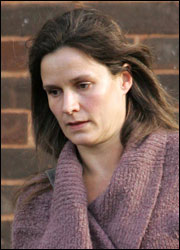
Posted by John Blacksmith at 16:57
Saturday, 07 August 2010
Those attempting to follow the rather muted court proceedings involving Robert Murat and Jane Tanner may be interested in
a little more background to the events that prompted them. Just how much comfort the outcome will bring to those interested
in the facts of the McCann affair and the possibility of truth emerging, however, is another matter.
The complaint
by Mr Murat is a criminal, not a civil, one of "calumnious denunciation". From that marvel of infinite flexibility
the Portuguese Penal code we learn that anyone "who by any means, before the authority or publicly, with the knowledge
of falsity of the imputation, denounces or casts upon a determined person the suspicion of the practice of crime, with intent
that against her it is placed a legal proceeding, shall be punished with imprisonment up to 3 years or with a fine."
To prove such a charge, convincing evidence that the perpetrator "had knowledge of the falsity of the imputation"
would be crucial.
No such evidence has been or will be adduced for the very good reason that there isn't any,
despite the continued scattergun smearing of M/S Tanner's supposed motives by the usual suspects.
But clause
two reads: "If the conduct consists in the false imputation of unlawful fact or disciplinary penalty, the agent is
punished with imprisonment of up to 1 year or a fine of up to 120 days."
Now that's a different ball
game altogether. No need for a lawyer to dive into the outdated cess pit of conspiracy, cover up and political protection
in the hopeless attempt to show that M/S Tanner knew that she was making a false accusation against Robert Murat. Just establishing
that she had mistakenly pointed a finger at Mr Murat might well be enough to secure a conviction, leaving all sorts of
juicy possibilities of civil actions stretching far into the future.
Because a very convincing case can be made
that it was neither the infamous Lori Campbell, nor the three Tapas 9 members who allegedly spotted Mr Murat on the night
of May 3, who triggered the police into all-out action, thus effectively ruining Murat's life; no, it was the supposed
identification of Murat as the figure later known as "bundleman" that was crucial.
The basis of that
claim is unambiguous. Goncalo Amaral made it clear that he was unwilling to turn the full might of the investigation onto
Murat unless there was evidence suggesting that he might be the famous but elusive "bundleman". Having obtained
a search warrant for Robert Murat's home, in his own words:
"Before the search, we want to assure
ourselves that Jane Tanner recognises him as the individual she saw on the night of the disappearance. She is sitting inside
an unmarked car, whose tinted windows allow her to see out without being spotted. The vehicle is parked at the exact spot
where she was on the night of May 3rd. Robert Murat, anonymous amongst plain clothes police officers, goes up the road in
the same way as the alleged abductor. Jane Tanner is adamant: it certainly is Robert Murat that she saw that night. She definitely
recognises his way of walking." And, he adds - the critical question - "But does he resemble the description
she painted previously?"
Quite apart from the havoc which ensued for Mr Murat this is also the key to
the entire abduction issue, much more important than the supposed "impossibilities" that Inspector Amaral made such
unfortunate mention of in his television documentary, more important indeed than the swamp-like and impenetrable testimonies
of the Tapas 9. If, a little over a week since the disappearance, M/S Tanner identified Robert Murat, the round faced, north-European
with short fair hair and, above all, spectacles, as the nightmarishly shadowy but indubitably long-haired, long-faced and
swarthy figure she claimed to have seen in similar lighting on May 3 then clearly she was a completely worthless eye-witness
who could not be relied on to have seen anything on the night of May 3. She was discredited.
It is doubly
unfortunate that this relatively simple question – whether or not a possible abductor had been witnessed
in the vicinity of apartment 5A — was not seen as the independently critical issue it undoubtedly was and dealt with
accordingly: that rarity in the McCann case a clear cut and resolvable conflict of evidence. Instead, once the excitement
of the descent on Murat had subsided, M/S Tanner's actions became tied up in the investigators' minds with the important
but completely separate matter of the potential case against Gerry and Kate McCann and the possibilities of collusion
between members of the Tapas 9.
A discredited Jane Tanner meant that there was no evidence of any abductor, only
of a disappearance. Naturally the question of why the nine closest witnesses should maintain a theory without anything to
support it, in other words a free invention of the human mind, would then arise in further questioning and could well have
become the focus of the investigation – an investigation that desperately needed focus rather than diffused suspicions.
And, a minor bonus, we would all have been spared the endless Rorschach-blot fantasies of the McCann/Mitchell press conferences
and "suspects." The consequences for the inquiry were ultimately enormous.
So what went wrong? Why should
the remote chance of clarification lie in an obscure and unpromising denunciation hearing three and a half years after events
rather than in the original investigation? We'll look a little deeper into those questions next but first I want to remind
readers who wish to refresh their memories of something I have pointed out ad infinitum here and in other places, without
result: in her only recorded questioning on the matter, during the rogatory interviews at Leicester police headquarters Jane
Tanner did not deny that she had identified the person she had watched from within the surveillance vehicle, Robert Murat,
as the person she had seen on May 3. She denied many things but not that.
|
Now you see it, now you don't, 10 August 2010 |
|
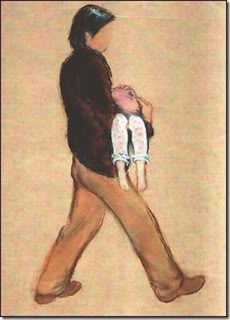
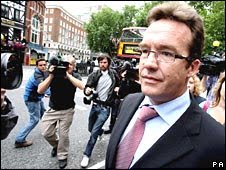
Posted by John Blacksmith at 12:48
Tuesday, 10 August 2010
By any standards of analysis there are few reasons to doubt the truth of Inspector Amaral's statement that Jane
Tanner identified Murat from the undercover van as the "fleeing abductor" she had seen on May 3. The evidence indicates
that there were numerous police officers involved in the planning and execution of the operation, including more than one
in the surveillance vehicle tasked with making a record of M/S Tanner's reactions. Nor was the initiative itself a private
whim of Amaral's - far from it: Bob Small, an officer from Leicester Police, was intimately involved in preparing the
action and played a greater role in carrying it out than Amaral himself.
M/S Tanner's response to the appearance
of Murat was reported by the officers in the vehicle without ambiguity. She herself made no claims that they had prompted
or intimidated her or in any way behaved improperly in any way during the identification process, and from the reports it
seems clear that there was no question of her muttering "yes, all right, it might be...," or of nodding her head
nervously to a barked and intimidating "that's him, isn't it?" No, the officers reported that she
was "adamant" that it was Murat whom she had seen on the night of May 3, and that she had added the telling detail
that she "definitely recognised his way of walking".
It is inconceivable that, faced with this battery
of witnesses able to refute his claims, Amaral would have chanced inventing Jane Tanner's responses. Naturally nobody
has rebutted, or even cast doubt on, his version.
Further support for the Amaral statement comes from a rather
unwanted direction. A dishonest claim that Jane Tanner "adamantly" nailed nice Mr Murat as the Bundleman Beast
really only makes sense if it was part of an attempt by the inspector to destroy her credibility by lies.
The
evidence suggests the opposite. It appears that Inspector Amaral didn't even have Jane Tanner in his sights: all that
mattered at that time, both to the PJ and to the UK police on site, was Murat, not Tanner, and it is perhaps for this reason
that there was no immediate analysis of the serious implications of what she had said and done in the van.
Goncalo
Amaral, in fact, seems to have temporarily lost interest in her. In the Truth of the Lie she disappears completely
for several chapters, the inspector concentrating instead on some extremely weak gossip about David Payne and Kate McCann
provided by English-speaking witnesses. M/S Tanner only seems to have drifted back into focus eventually as a sort of by-product
of Amaral's mounting, but highly diffuse, suspicions about the Tapas 9 members and their lifestyles.
So the
mooted reconstruction of the events of May 3 was abandoned and Jane Tanner was allowed to leave on May 17, rather than having
to stay, play her role and identify Bundleman under the eyes of watching policemen with the shared memory of what she had
said in the van fresh in her mind. The Truth of the Lie is vague and slightly defensive about the reasons for not
proceeding with the reconstruction before the nine left, but it is hard to avoid the conclusion that with Murat apparently
in the bag and his life being publicly shredded, everyone, UK police included, thought it wouldn't be needed.
|
M/S Tanner takes the stage, 10 August 2010 |
|
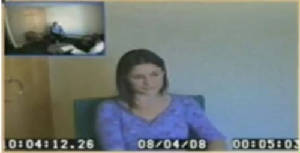
|
| M/S Tanner in performance at Leicester Police HQ. |
Posted by John Blacksmith at 13:41
Tuesday, 10 August 2010
Now, for those who are interested and have the stamina to cope with the detail, we can turn from Inspector
Amaral's one hundred or so word description of the episode to Jane Tanner's version, part of the statement, made on
video and with Portuguese police officers watching behind a one-way screen, at Leicester police headquarters in April 2008.
The McCann affair has many minor theatrical dramas within the main story. Kate's dulled refusal to answer the
forty eight questions; Gerry McCann suddenly exploding into spitting anger outside a Lisbon court house; the weird atmosphere,
somehow suggestive of past evils, emanating from the echoing car park in the Grimes dogs' video, and many others. Jane
Tanner answering the police questioner's quiet, "and can you just go on to tell me a bit more about that surveillance?"
lacks the high drama of these scenes but is nevertheless one for the connoisseurs.
What I did on my walk,
or everything you didn't need to know
The officer received much more than one bit but they weren't
necessarily the bits he wanted. M/S Tanner begins with a lengthy overture to the event itself, including detailed descriptions
of how she was contacted by Bob Small to carry out the observation, ("And Bob Small rang, erm, rang me," she told
Detective Constable Ferguson, adding helpfully, "on my phone"). The officer listens in virtual silence as she gives
an account of her walk to the rendezvous point so implacably detailed that one wonders if she'll quote the humidity figures
for the day and the size of the shoes she was wearing.
Why hurry? There were lots and lots of things to describe,
including encounters and conversations on the way, one of them with Robert Murat - "He jumped out and said
hi," said ever helpful Jane - as she walked past his house. Her recall was outstanding. A year after the event she
remembered the colour of his car and, strikingly, was even able to tell her questioner the thoughts and reactions going through
her head while she was talking to him. She describes in further detail her overwrought and fearful emotional state at the
time of this pilgrimage through Praia da Luz, much of it to do with a misunderstanding about which police would be in the
van and whether they might abduct her. Finally, finally, she arrived at the van and described its disguise as a refrigerated
vehicle.
After this performance DC Ferguson could be forgiven for expecting an equally comprehensive description
of the only matter that he or anyone else cared about – what the bloody hell did she say inside the van when Murat
appeared? Perhaps it is, after all, better to travel than arrive: the flood of verbosity suddenly ebbed. About the big question
– not a whisper.
Poker anyone?
Behind the silent transcript serious games
are being played by both sides. Jane Tanner knew perfectly well that somewhere there was a record, perhaps even a bugging,
of what was said in the van that night. She also knew, because of Bob Small's involvement, that the record had to be known
to Leicester police themselves and, by extension, to that very police officer facing her from the other side of the desk giving
absolutely no indication of how much he knew.
M/S Tanner, clearly a nervy enough type, could be forgiven
for suspecting a trap. Despite her interrogator's courteous demeanour, he and she both knew that whatever description
she gave of the supposed identification incident would carry its own information. If she said that she had identified Robert
Murat as the Bundling Beast then she was discredited once more, but this time finally and decisively. If she denied
it and yet the record showed what Amaral claimed, then it was worse – she had fingered Murat but was now confirmed as
a liar as well, with all the messages that would carry. Bob Small, as far as she knew, might even be behind the one way viewing
screen in the interview room with the watching Portuguese, transcript of the surveillance in hand. As for a refusal to discuss
whether she had indentified him in the van or not, well, that would be a milestone, the first outright refusal to give significant
evidence by any of the Tapas 7.
With one bound...
She said absolutely nothing. This
is the full and complete transcript of Jane Tanner's description of whether or not she identified the passing Murat as
Bundleman:
"Bob drove me up to where, erm, the rest of the team were to do the surveillance. Erm, so I went
off in the back of this like refrigerated, well it was pretending to be a refrigerated, erm, van and took it round to the
point on the road and obviously, in hindsight now, I realise they [the officers in the street, not in the van] were
probably calling Robert Murat to try and get him to walk across, across the top of the road so that, you know, I could see.
[Not a word so far about the issue] But it was a bit odd because there was a car, where we were parked there was
a car that moved just at that point that he appeared and then two other people walked by, so I didn't really, but I didn't
even recognise it as the person I'd been talking to five minutes before [my italics JB. Note that this does not refer
to the identification or otherwise of Murat in the street as Bundleman but to her apparent failure to recognise the Murat
in the street with the Murat she had encountered outside his house] well, you know, half an hour before, so. Erm, and
then, erm, [here come the erms] then went, I think because it has gone a bit wrong because this car had been there
and then tried to set it up elsewhere, but again I couldn't really see, I couldn't really see that well and, you know,
it didn't look, it didn't jog, jog any memories". [Still not a single confirmation or denial of the identification]
As Jane Tanner might say, Whew!
The transcript does not tell us how Jane Tanner
got away with this dying fall. Did her words tail off slowly? Had she, once again, started to sob? Had she bored DC Ferguson
to death? Or had he found out what he wanted to know?
"Now," he says, "you are left with that mental
image in your head about the man carrying the child."
[He is talking about her description of the May 3 sighting
earlier in the interview]
"Um," said Jane.
"And you said, you described his hair
quite well. Having seen Murat then and obviously in the papers since, could you link the two of those?"
[NB
not "did you link the two of those that night?"]
"I don't think so. I mean, I don't,
phew, I don't, I don't think it, no, there doesn't, there's no, but then the person I see in the paper doesn't
really look like my recollection of the person I met on the way to meet Bob Small. [Still not a word] It's really
annoying because normally I would have probably taken more notice but I was so worried about what I was going to do, because
I didn't know at this point at all, I didn't really take any notice, but I think it was too short and [still nothing]
I remember it being, being long into the neck and not so. [still nothing] Again, I don't really, when I saw Robert
Murat outside his house he looked quite little to me, but then when you see him on the telly he seems quite bit, so I can't,
again, I don't think the build, the build was right, I don't..." [She describes Murat outside his house and
on the television. No mention of what she said and did in the van.]
Another dying fall.The officer effectively
ends the matter, with a question that is not only leading but does not concern the subject of the surveillance responses at
all, only whether or not M/S Tanner feels, in April 2008, that Murat and Bundleman are the same person.
"So
you don't feel, in your heart of hearts".
"No".
"You don't feel it was the same person?"[NOT
"you didn't SAY it was the same person.]
"No, I don't, no".
Hardly a surprise,
that last answer. But it had been quite a performance. It is almost superfluous to point out that the whole issue could have
been dealt with in fifteen seconds had M/S Tanner wished to do so – along the lines of yes, they produced Robert
Murat and I didn't think it was the man I'd seen on May 3 and I told them so. Jane Tanner, for whatever reasons,
skilfully evaded the only issue at hand.
As always Leicester police have played their cards very close to their
chests. Despite the restrictions of the rogatory letters they could have probed Jane Tanner's answers a little more but
chose not to. Why would that be? And why had the Portuguese not mentioned the surveillance incident in the list of questions
they wanted Jane Tanner asked in Leicester?
|
Reasons to be cheerful?, 10 August 2010 |
Reasons to be cheerful? The Blacksmith Bureau
Posted by John Blacksmith at 17:11
Tuesday, 10 August 2010
So
will Jane Tanner finally give us all some answers one day in a Portuguese courtroom? It's not impossible, though
it is likely to depend more on Robert Murat's strength of motivation and stamina, than on the supposed facts of the case.
If the finding went Mr Murat's way it would make him, properly handled, a multi-millionaire in the longer run, but he
may not wish to pursue that route. What about the record of the surveillance van episode though? What if that appeared via
the court proceedings?
Leaving aside the impossibility of predicting anything pertaining to the Portuguese legal
system it is hard to be completely optimistic. The operation that Jane Tanner and Goncalo Amaral described involved,
we can be sure, plenty of documentation: location and usage records for the refrigerated van, the names of the officers allocated
to the case, timesheets, the instructions for the operation itself and its modus operandi. And, lastly, the report provided
by the officers in the van to Inspector Amaral, together with information copies where required.
If you thought
Jane Tanner was quiet then what about the Portuguese police and prosecutors? Where are the records? None of the above documents
are in the case files, nor is there any clue as to who took the decision to exclude them and who that person answers to. Those
who feel that that same legal system is holding back information for devastating future use against the McCanns may be pleased
and reassured about this, as may those who feel Goncalo Amaral has a number of smoking guns hidden behind his back. For the
rest of us it is another matter.
When it came to the preparation of the rogatory letters calling for the UK interviews
in 2008 the Portuguese made no request for Jane Tanner to be questioned about her presence in the surveillance van, an
omission which seems odder the more you think about it. The preliminary statement of facts in the rogatory letters ran:
"...since the beginning the parents attributed the disappearance of the child to an act committed by third parties,
claiming it was an abduction...and using an intense media campaign. Time went on without this scenario being absolutely confirmed...However,
and in view of the statement made by one of their friends, Jane Tanner, we could be facing such a scenario."
So the further investigation of Jane Tanner's evidence and credibility was at the heart of the rogatory request. The
incident in the van was perhaps the biggest test of all and yet the Rebelo team wanted nothing whatever to do with it.
I spent a certain amount of time in 2009 attempting to locate the whereabouts of any of the documents, without result.
In addition to their relevance to M/S Tanner they were, I felt, of very material interest regarding the McCanns,
not because of collusion about false evidence between them, but because the parents and their lawyers, as we know, had developed their
version of events between 8.55 and 9.25 on May 3 around the time constraints imposed by Jane Tanner's "sighting".
The production of documents discrediting her witness abilities would, at the least, I thought, have repercussions in the UK
ahead of the various McCann media initiatives preceding the Portuguese injunction hearings; it is hard to believe that
the Cutting Edge documentary, for example, would have taken quite the same form with the report of the officers in
the surveillance van now circulating in the public domain.
Inspector Amaral and his team apparently did
not agree with me. After a very lengthy attempt to get him to throw any light he could on the matter, during which I got the
impression that my view as to the significance of the stuff was not shared, I was finally passed a response by an intermediary.
The documents were "probably" not in the case files because the operation itself did not conform to identification
guidelines and would have been inadmissible in court.
Hmm. So there it rests. As for the admissibility
issue, well, the dog videos wouldn't have been admissible either and yet they found their way into the wider world,
and are key components not of the Madeleine McCann investigative and judicial process but of the larger, and longer lasting,
Madeleine McCann Affair.
In view of the answer I was given the question of whether the operation was
actually legal under Portuguese law arises. If it was illegal then naturally that would explain why such a survivor as Rebelo
wouldn't touch the issue with a barge pole, and there are endless troublesome possibilities, even now. A case might even
be made that the police themselves had been party to the "calumnious denunciation" of Robert Murat. In any case
victory, as they say, has many parents; defeat is an orphan.
Looking back, the presence of Bob Small that night
may have been a lucky break. The only reason we know anything about the surveillance, apart from Goncalo Amaral's one
hundred words, is because Leicester Police (helped or not helped, unofficially, by the Portuguese) without authorization
under the rogatory letters, took it upon themselves to let Jane Tanner give her unique take on the matter. They
clearly know what was said in the van and and we can be fairly sure that whatever documents exist in the UK are
not going to be "vanished".
For the supreme optimists among us, who knows, the silence about them in
Portugal might be at British request. Why, that might even be a factor in the McCanns' visit to the fragrant Theresa
May and their demands - constant, now, since June 2008 – to get access to just what files both police forces may have
in their possession. Jane Tanner played a good hand but I suspect the affable DC Ferguson held, and holds, the stronger cards.
|
It's not too late, 11 August 2010 |
|
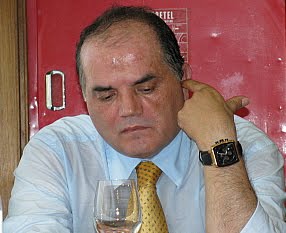
Posted by John Blacksmith at 17:55
Tuesday, 11 August 2010
A high-profile defended UK libel trial is a winner-takes-all game. Ideally success requires a number of things.
First, a long purse. Without it nothing can be done. The English civil justice system uses a high proportion of the best legal
brains in the world, and they rightly earn a great deal of money. The meticulous research effort required to put a case together
that will stand up to the ferocious ability of these lawyers to shred and dismantle weakly based claims – and UK civil
lawyers leave prosecutors standing in their courtroom skills - means the preparation of the case has to call on more of the
finest brains available, this time as researchers and experts in the appropriate field.
A network of specialist
assistants and private investigators, on hourly and daily charges, working for the lawyers, has to perform the mundane but,
again, expensive, task of simply locating these people, from anywhere in the world, to assist in the case. Everything has
to be paid for: paper, paperclips, copying, transcript services, phone calls – the bill for those alone, before a single
professional fee is paid, will run into thousands.
It is pointless embarking on such a venture, therefore, without
at least a million pounds available to finance it, either by owning it, earning it, or setting up a powerful fund to
raise that kind of money. The latter, in turn, requires a large number of people emotionally committed to a simple-to-understand
cause and an expert group, including volunteers, able to mobilise them. There is no evidence that Goncalo Amaral has either.
Some of the books written by participants in the Irving v Lipschitz libel case are models of how a well-planned,
but above all professional, defence can be financed and led. It is difficult to see many parallels with the inspector's
case. Financially Goncalo Amaral is weakened and the (literally) world-wide constituency of potential supporters has clearly
not rallied, or been encouraged, to his side with large-scale contributions; there has, indeed, been little evidence of international
campaigning with the object of raising serious amounts. Nor, very surprisingly, is there any evidence of rich individuals
in Portugal rallying to his cause with their own funds. The McCanns have had both a fund and a bank of public sympathy to
call upon, neither of them yet drained, as well as wealthy individuals willing to spend in their support.
And
that is before we turn to the merits of the case. My own belief is that there is evidence, much of it summarised in previous
Bureau entries, of conduct by the parents that amounts to a "suggestive pattern of behaviour", one consistent
with a desire for the Portuguese investigation into their child’s death to "fail".
There could
be many reasons why the parents felt and acted in such a claimed way, loss of confidence in the abilities of the Portuguese
police, lack of belief in their objectivity and the fear that they might be unjustly accused obviously among them. But there
is certainly a less charitable case that can be made and then it would be for the court to decide it on the merits
of the evidence, including cross examination. Inspector Amaral himself would have a status within this framework as someone
more than the author of an accusatory book: if, as Carlos Anjos alleged, there was actual obstruction of the investigation,
then the inspector himself was possibly a victim of such obstruction, both via the media briefings against him and in
the circumstances preceding his resignation.
But that's just my view and there is no guarantee of victory.
There may be another strategy, a different attack or defence; whatever it might be, though, there has to be a foundation
slab of factual evidence underlying it to offer the slightest chance of success. And, given the profile of the McCann
affair, it needs a top lawyer to build it.
I have seen no evidence of such a case being marshalled in the classic
sense – assistants and volunteers organizing research work, appeals for information in Portugal, private investigators
or, again, volunteers, making the rounds of those participants who have retired and are free to speak, or any other manifestations
of a determined and focused case-building exercise.
Instead we have, as we know from the pronouncements of the
inspector and his supporters, a number of scattergun assertions and suspicions about the possible guilt of the McCanns and
their circle – the Gaspar stuff, the belief that "The British Empire" is against Portugal, the fraudulent
fund claims, the belief that that benighted incompetent Gordon Brown had protected the gang – the list goes on. Some
of Goncalo Amaral's widespread and diffuse suspicions might have an element of truth behind them, but as libel courtroom
evidence they would not even fail: any decent English lawyer would tell the inspector – "we simply can't go
into court with this stuff, the judge will just throw it in the bin: it's worthless."
It is English lawyers,
their fangs sharpened by the adversarial English system to a degree that I don't believe Iberian lawyers can conceive,
who jumped on the assertion that the child was dead, together with the implication that the parents knew it. Given that assertion,
combined with the exceptionally unwise and incorrect statement in the Truth of the Lie documentary that the McCanns'
version of the abduction was "impossible" they simply rubbed their hands and waited for the money to roll in. They
knew immediately that the McCann legal teams in both countries didn't even have to make a case: they only had to invite
Amaral to provide any evidence for two libellous claims. And of course there isn't any; opinions yes, evidence
no.
I believe that Inspector Amaral is a brave man whose career may have been wrecked through the possible failure
of the Tapas Nine to help wholeheartedly with the investigation into the death of Madeleine McCann, a failure which as we
know from the performance of Jane Tanner in front of the Leicester police, reached as far as the UK as well. And I believe
he deserves justice.
His professional advisors are something else. No lawyer should ever have let him make the
above statements: he either failed to use one or he was dreadfully, appallingly, advised. His current lawyer, or lawyers,
are, as the injunction hearings showed, totally out of their depth. Not only were they unaware of the treaty rigmarole which
had to precede any appearance by officer De Freitas, thus leaving both that officer and Amaral to be humiliated by Scotland
Yard and the Home Office, but the case they presented was a disgrace, warmed leftovers from 2007 and an apparent inability
to respond to real-time events in the courtroom.
The prosecutor's testimony that the couple had not told the
truth was a gaping open door – which Amaral's lawyer failed even to see, let alone to kick aside. It was hard, very
hard, to listen to the English press outside the courtroom impatiently and contemptuously asking, "yes, yes, but what's
new?" The McCanns' lawyer, the umbrella wielding Isabel Duarte, not the most impressive advocate since Cicero, was
able to bellow her way to victory without any problems from her opponent.
And then there are the unprofessional
advisors, the not very intelligent, not very scrupulous, individuals who have invited themselves into the inspector's
circle, one or two of them in the UK. Until the inspector has a house-cleaning he will remain within a group of people who simply
cannot be taken seriously by lawyers, policemen or even, outside Portugal, journalists. By their constant search for
shadowy culprits, their lazy posturing on Portuguese television screens and their collective inability to put a case together
that can command respect - rather than kid's comic stuff - as well as their transparent exploitation of Amaral's fame
for their own ends, they are enclosing the inspector in a very dangerous bubble of illusion.
It may be that the
inspector no longer wishes to go to the UK courts via an edition of the Truth of the Lie. But nothing stands
still and the power of the McCanns' professional advisors will still reach as far as the Portuguese courts, so whatever
happens something new is surely necessary. Goncalo, there are people who are gaining by their association with you, professionally
and otherwise, but if things go tits up it's only you who will pay the price. Wake up before it’s too late:
start afresh!
|
If it walks like a duck..., 14 August 2010 |
If it walks like a duck... The Blacksmith Bureau
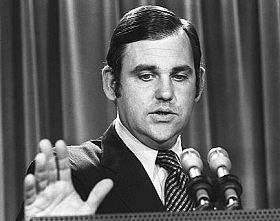 |
| The daddy of them all, Nixon's spokesman lying |
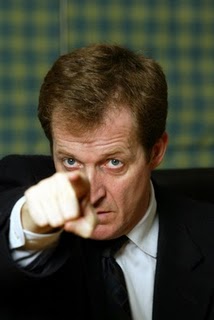 |
| Alastair Campbell, war hero, "spinning" |
| |
Posted by John Blacksmith at 13:38
Saturday, 14 August 2010
The departure of the Labour Government has, probably temporarily, left the air as sweet as a woodland misty morning. Even
that declining constituency, the news media, seems almost relieved that the incessant double talk from government has drastically
diminished, and that the new prime minister is actually willing to speak directly and risk being stuck with comments he can't
deny. And the budget for the Central Office of Information, once an old-fashioned department for providing the public
with neutral information, latterly a propaganda machine full of paid puffers and failed newsreaders, is due to have its
huge budget cut back to - note the date - 1996 levels.
The media management project which began to rot and founder
after the Iraq war had by 2007 sunk into a culture of defensive secrecy, behind which lay the impossibility of selling a paranoid
loser like Gordon Brown to the public and the impending doom of the expenses scandal. Chris Mullin, one of the token idealists
in the government, seduced into it by the wily charm of his hero Tony Blair, was a hair-shirted puritan who could hardly bring
himself to use government cars; this worthy wrote in his diary that "everyone" (in government) knew that the
expenses stuff was going to come out one day. A pity he couldn't bring himself to tell the public about it.
Nothing
takes us back from the clean August air of 2010 to the foetid gloom of that horrible period as rapidly as the Madeleine
McCann affair. The episode showed that the culture of news management had spread like an infection across British public life,
a private game played between the media and anyone – business, local government, the police, the NHS, the Natwest banker
thieves – who wanted to present a version, a "story" to the public through PR and spokesmen. In other
words lies.
 |
|
Alex
Woolfall,
ex-spokesman
for Enron,
working |
Spokespeople are paid liars: that is their sole function. Of course they, and the people who employ them, deny
it – what else would one expect? The media themselves know it since many of its members have moved smoothly between
the declining fourth estate and the cancerously growing PR industry over past decades. Only the public isn't let into
the game. Whether you've shot an innocent Brazilian by mistake, lost a patient under an incompetent's knife or dumped
toxic waste all over African villagers, it's all the same: set up a meeting, call in the spokespeople, work out a "line"
– that is, a version of events - and then start dialling the editors. A smooth lie machine. And of course, properly
presented, lies sell newspapers and bring in TV advertising.
We know how it works, we have the transcript evidence
of how it's done going back forty years, from when President Nixon, the klutz, bugged himself and his aides working out
the daily "line" as they struggled to head off impeachment and prison, then calling the press spokesman into the
meeting to rehearse it and look for "vulnerabilities" in the lie.
Twenty five years later, in 1997,
Campbell and chums sorted out a "line" for the coming day – yes, sometimes they sound like cokeheads, don't
they? – before calling up the editors to get their version in first. A story a day was key to the project – it
plopped into editors' and journalists' laps, saving them the trouble of investigating for themselves, it was backed
up with links to photo-ops or other "evidence" and if they wanted clarification, why they could always ring Campbell
and co. back. All unattributable, of course.
Remember this one?
"Every morning, [in the weeks
after May 3] Woolfall and the McCanns worked on a strategy for the day after they had brainstormed ideas overnight with a
close circle of friends in Britain. They then organised a series of carefully scheduled statements, interviews and photo-opportunities."
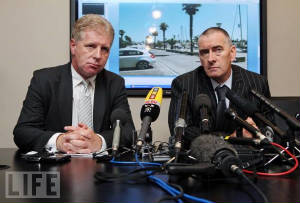 |
| The coffin, making us laugh |
| |
Sound familiar? But, of course, it wasn't a "line",
was it? No, it was the heroic attempt to gain publicity for the sad parents and their missing child, you know those parents
who really, really, needed publicity, the poor forgotten things.
|
As cleared as mud, 18 August 2010 |
|
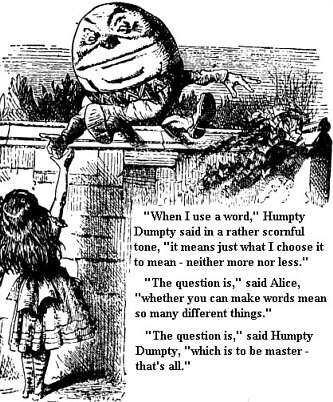
|
| Mr Cunha de Magalhaes e Menezes being interviewed by Sandra Felgueiras |
|
Posted by John Blacksmith at 16:10
Wednesday, 18 August 2010
When the Bureau criticised Amaral's legal team in the strongest terms recently we mentioned its
apparent inability to profit from the open door provided by the testimony of the prosecutor, Mr Cunha de Magalhaes e Menezes,
at the gagging appeal hearings. The report that the prosecutor had written, the one which the parents in their inimitable
way claimed "cleared" them, came to form the basis of the McCanns' legal case against the inspector.
The original case, a typical piece of McCann disingenuousness dependent on the case papers not being widely read, was that
Amaral was a loose cannon, a "disgrace", a loner with whom none of the other police - decent chaps - agreed.
Studies of the case files destroyed this argument. Unfortunately the short suicide note, or gift horse, that
Goncalo's "dead in the apartment" gaffe amounted to enabled the lawyers to slip away from the original claim
and shift their ground: Yes, the Inspector Tavares De Almeida's interim police report in September 2007 undeniably
reflected a virtually unanimous case against the parents - but it was only interim. The prosecutor's final
report of 2008 was the summation of the case - and Amaral had ignored it in his book. He had, therefore, picked out evidence
which suited him, and by implication his book sales, and ignored evidence which did not support his case in the same way.
That was not what a genuinely impartial person looking for the truth would, or should do. The transition was complete.
This clever and elegant restatement of the case, which eventually nailed Amaral at the gagging hearings had, however,
its vulnerabilities, as the legal team knew. There were two: the first was the startlingly ambiguous nature of the final report
itself which correctly outlined the lack of any convincing evidence of parental guilt likely to gain a conviction, but followed
it up with explicit evidence of non-co-operation by the Tapas 9. The second, the crucial area, the point of balance of the
whole case, was what exactly happened in the interval between the two reports. We know to the point of exhaustion what Amaral's
team did but what exactly did Rebelo's officers add to the investigation?
As for the first, Amaral's lawyer,
if he was any good, would clearly be expected to draw the prosecutor out on the matter of inferences. From the lack
of solid evidence for parental involvement that would convince a "reasonable man", the prosecutor inferred in his
report the possibility of their innocence. From the evidence of non-co-operation, on the other hand, he refused to
make any inferences at all. Why the difference? A lawyer like James Dingemans QC, granted perhaps the best legal brain
in the UK, would have been rubbing his hands at the prospect of taking the prosecutor through this shambles of a report line
by line.
As for the second area, even the phlegmatic Mr Dingemans might have grown excited. What exactly
had changed between the writing of the two reports apart from a failure to strengthen the beliefs of the investigators into
a 51% likelihood of conviction for an offence? What evidence had Rebelo uncovered to invalidate the conclusions
of the interim report rather than merely giving up on the hope of using them in court? How, for example, had the original
forensic findings regarding the shutters, window etc, which had implanted severe doubts over the possibility of abduction
in the police team's minds, been countered or corrected? Had the contradictions in the Tapas group's timelines been
clarified? The McCanns' defence team avoided this whole area as if it were a piece of stinking fish because there's
nothing there, is there? All that differs in the two phases are the opinions, the interpretations as to the likelihood of
a conviction of the parents for anything, which is something very, very different from evidence of exoneration.
A
glance at what happened to the third arguido Robert Murat is sufficient. The case against him was not left in any doubt, or
re-interpreted: it was dismantled, leaving nothing of the original suspicions and not the slightest evidence that he had failed
to co-operate with the investigation – on the contrary. The contrast with the other two arguidos, the pair who ran away
from Portugal, is clear and brutal.
This is why the McCanns' legal team, particularly the UK end, where all
the research had been done, was by no means confident of a result before the start of the gagging hearings, since they had
no convincing fallback if the two vulnerabilities were properly exploited. They had no need to worry. Goncalo Amaral's
lawyer, who will be remembered chiefly for going sick before the first hearing, decided not to ask why the claim that
Amaral was a Lone Ranger had been expunged and to go for the time warp defence: wheeling out the witnesses as if it were May
2007 and staying clear of researching the investigative details of the Rebelo phase. That, apparently, remains a job to be
done.
 |
| Humpty Dumpty after giving up the olive oil and losing 10 kilos. Someone is whispering in his ear. |
| |
That was bad enough. But if, through lack of focus and research
the lawyer couldn't ask the prosecutor what facts had changed or emerged during the time interval to justify the reverse
gear into which the report had been slammed, he could still salvage something with the contradictions and the differing attitude
to inferences. Why, exactly, he could ask, as he went through the report line by line, why had the stuff about contradictions
in the T9 evidence been put into the report? Why exactly was the failure to participate in the reconstruction mentioned so
prominently? Now we know the answer to that – the police were insistent that it had to go in – but it would have
been good to hear the prosecutor's view together with the killer question: was there a deficiency of information regarding
the parents' role as a result of the aborted reconstruction, yes, or no? Could a successful reconstruction have altered
the conclusions of your report? Yes or no?
In fact the lawyer could have spared us all and gone off for
a cup of tea rather than cross-examining Mr Cunha de Magalhaes e Menezes. Not only did he not go through the report in this
way but he hardly found it worthy of notice that the Portimao prosecutor had volunteered the information that the Tapas 9
had not been completely truthful. Some desultory questioning around the edges of this potential gold-mine led to airy hand-waving
from the prosecutor as he explained briefly that it wasn't crucial. And that was it.
What wasn't
crucial? Were the police on record as saying they weren't crucial? Can you give us some examples please? Now,
can we turn to the letters from all of the 7 refusing to attend the reconstruction – can we go through their reasons
please? Do you believe those reasons hold water? And so on.
Instead the lawyer moved on to other things, presumably
to the sound of popping champagne corks around the UK team's television screens. And then onto eventual defeat, though
whether things will remain that way in the future we don't know.
It need hardly be added that the Bureau
does not suggest that Inspector Amaral was correct in his claims that the child died in the apartment and the parents,
with help, covered it up. Nor do we think that Humpty was corrupt, a stooge or anything other than someone struggling
to bring a conclusion to a case that was going nowhere and which the infinitely flexible Portuguese legal system wanted shot
of. The question, at root, is did the failure to make a case against the McCanns - and we can all agree there was no case
- derive from lack of co-operation by the Tapas 9 or not? The chance to cross-examine the Portimao prosecutor on
this question and the cirumstances surrounding his intellectually weak and politicised report was missed: a loss
not just to Amaral but to the historical record, to all of us, including the parents and their hopes of "exoneration".
Still, back to these "non-crucial" fibs. or inaccuracies. They are a subject dear to the hearts
of McCann supporters, in what one might call the fallback case. The claim waiting in the wings, as it were, is that if the
group are shown to have lied or misled in their original statements why, let's face it, be reasonable, be realistic,
they were all just worried that they might be accused of neglect by the child-protection fascists and their innocent
lapse punished wrongly and disproportionately. OK, not completely frank but only for that reason, nothing to do with anything
sinister.
We can turn to that one next, bearing in mind one very interesting fact: whatever the media columnists
- we've all done it - and good old friends 'n' family might have hinted, the parents, and indeed the
Tapas 7 have never so much as whispered about this possible reason for telling "non-crucial" untruths. Complete
silence. Now why might that be?
|
Oh God, philosophy, 03 September 2010 |

|
| Karl Popper listens to Kate McCann |
Posted by John Blacksmith at 14:54
Friday, 3 September 2010
The philosopher Karl Popper – said blacksmith, once again getting all pretentious – compared the scientific
enterprise to a light beam in the darkness: picture a circle of light on a cellar floor thrown by a torch. New facts are discovered
and what were once considered facts are discarded, new theories arise, often from major disagreements between scientists,
old ideas die out one by one but, due to the special nature of scientific research, the pool of light always gets larger.
It is the cumulative nature of such research, Sir Karl claimed, that makes it so special – as long, that is,
as the scientific method is followed: once something is established, as facts are established in a court of
law, one moves on, not, as in other fields of inquiry, re-opening the same questions time after time according to one’s
own mood, or opinions. The latter happens, of course, as we know all too well, but then it is no longer science.
One can agree or disagree with Sir Karl's implied belief that the light will eventually fill the whole universe. What
a thought! All those university heads saying, that's it, we've discovered everything, we're going home now,
all the bosses of the money-pits like the farcical Large Hadron Collider saying, we don't want taxpayers' money
any more and we'd like to give it back. No, we don't think so, somehow.
Neither Sir Karl nor the weird
and unfortunate Stephen Hawking ever acknowledged that this belief in the eventual triumph of science is merely a faith,
in exactly the same sense as religious faith, but let's not bother with that. Back in the smaller world of problem solving
we can share in the optimism which science can induce, without faith but with evidence instead.
The Bureau
sees every sign that the pool of light which began as a dot in the darkness of Praia da Luz on May 4 2007 has slowly, and
with fits and starts, grown larger and larger. Not just to the size of a dinner plate: more like a football ground floodlight.
None of this light has yet shone on the exact path taken by the people who disposed of the child and it is entirely possible
that, in the narrow definition of a "case," it will remain unsolved as far as details are concerned;
but we already know pretty much enough. In fifty years time if someone wants to write a book about Madeleine McCann claiming,
like Jack the Ripper books, that the Queen or Gordon Brown or that fabulous beast the "tenth tapas", did away
with the child they won't have a free run – unless, that is, they and their readers wish to ignore the pool of light,
the evidence.
Unfortunately for Kate and Gerry McCann – and the Tapas Seven, together with all their
children - the light has shown up nothing, not even a dust particle, to support their various versions of events. Nothing.
Given the activities of their own detectives, the Metodo group and other investigators and the highly watchful public ready
to report anything from Alaska to the Antarctic, one would have expected at the very least some hopeful mysteries, some loose
ends worthy of further investigation, if nothing really solid. Nope. Not only is there nothing but the supposed
leads have been exposed as bogus or worthless at extraordinary speed.
We can leave the Burned Letter Mystery aside
as unworthy of comment, although the reaction of the McCann camp to it is itself evidence, if only of the increasing
loss of a sense of reality there. But think of the others - of the lady, for example, who, Goatherd Edgar told
us at a press conference, had interrogated various strangers as the quayside, apparently expecting them to be delivering Madeleine
as per request. Well, you might think, that one could run and run, in fifty years time a Duke of Clarence was the Ripper
book could build a case around such a suggestive lead - but no: with seven billion people on the planet to search among, the
original of the supposed child buyer was uncovered within days! Unlike, ahem, a living Madeleine McCann after three years.
Or, another example, the Morocco sightings. Ah, Morocco: lots of mountains, tribesmen, including the strange Blue
People, deranged kif-smokers, wealthy European paedophile exiles behind whitewashed courtyard walls, even slaves from south
of the Sahara – I mean it's a film set for mysteries that will run for ever. Not for the McCanns it isn't: the
little blonde child spotted on the back of a robed native had every right to disappear into the Rif, her blurry features launching
a thousand publishers' advances – but no. The kid was tracked down within the week. Unlike, hmm, a living
Madeleine McCann after three years.
And there are many other such examples of "leads" being not just
dubious, or unverifiable but immediately falsified, despite the supposed "research" that had gone into them, far
more, as both we and the police know, than the science of statistics suggests there should be. The inability of the parents'
camp to see how genuinely comical their leads have become - can anyone forget the derision of the media mob
at last year's press conference? - is becoming increasingly weird but who cares, who needs to speculate? The evidence
is enough.
For if the attempts of the parents and their gruesome helpers have thrown as much light on the "abduction"
as their wretched balloon candles hissing in the drizzle before plunging to the ground, it is quite otherwise for the Affair
as a whole. Our pool of light shows such things – to pluck mere examples out of a rich collection - as accounts to prove
just where the Fund bonanza went as well as the testimony of such McCann supporters as the Portuguese lawyer who tried to
frame Amaral with money from the Fund channelled to him by Metodo. Plus the superb collection of excuses, all in the written
record, from the Tapas Nine as they successfully aborted the requested reconstruction.
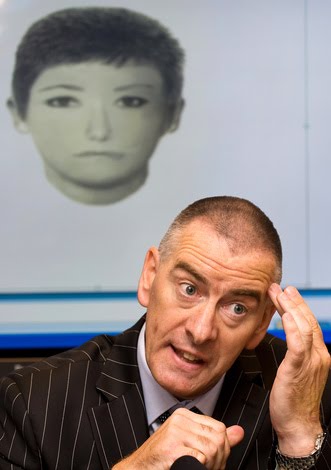
|
| The herdsman expounds philosophical truths |
No Stone Unturned - how very appropriate was the name
they chose. All the strutting and posing of 2007, all the presentation and propaganda stuff which people like the Coffin
and Smethhurst actually believed achieved something real rather than illusory, is in the past along with other media trash
- yesterday's news. While the light shines ever more widely on the slug-infested, slimy reality - did any public
drama ever possess such an unpleasant cast? - which always underlay it.
|
| |
Entertaining Mr Mitchell, 17 September 2010 |
| |
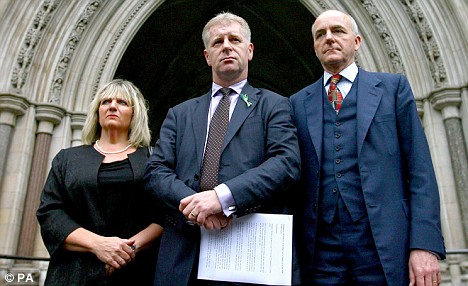
|
| Our hero in characteristically modest pose |
Posted by John Blacksmith at 00:12
Friday, 17 September 2010
Anyone new to the McCann case – the Bureau's target audience - must be slightly puzzled
by the opprobrium that our friend the Coffin, AKA Clarence Mitchell, seems to attract. Just what is it about him? Why,
in particular, do critics of the saintly parents' Authorized Version of events criticise and abuse him more than almost
anyone else involved in the case?
Birds of a feather?
Even that grim whiner Gerry McCann
hardly attracts the verbal flak that bursts around Mitchell every time his absurd, Muppet-like features, augmented recently
by what appears to be a cheap synthetic wig, appear on the screen. Partly that is because McCann is so genuinely repulsive
that one just wants to leave the room, shaking one's head, or scrabble among the cushions for the remote control: anything,
anything, perhaps even Simon Cowell, God forbid, to drive away the memory of the McCann voice, that sneering
whine with its toxic mix of aggression, spurious justification and self pity, so reminiscent of the petty criminals who daily
traipse through the district courts of his native Glasgow.
Mitchell isn't repulsive in this I-need-a-shower-after-watching-him
sense; instead one wants to hurl ripe tomatoes at the screen while shouting you can't believe this shit, you imbecile,
you just can't! before falling into stunned silence and then vain fantasies - that the Goatherd Edgar, for instance,
will suddenly snap, leap from his chair and hurl himself upon his team mate, seizing his puffy neck with both those giant
stranglers' hands.
Voice from the pit
Mitchell inflames people, we think, both
because of what he is - his manifestly odious personality - and, more important, the related matter of what he does. Of all
the actors in this drama Mitchell is the one with the fewest excuses, the one who, above all others, chose to involve himself
in the affair – and people sense it.
The prime movers, the McCanns and the Tapas 7, all - according to the
Portuguese police - found themselves at the centre of a nightmare that was not originally of their own choosing. The family
clans who sprang to their defence with their instinctive underclass distrust of the police were sucked in by their children.
Others, like Amaral, had to descend into this cess pit due to the demands of their professions; still others, like the hapless,
stumbling Gordon Brown walked into it because of their lack of political nous.
Clarence Mitchell is different:
he sought out the opportunities offered by the shit-filled tank and chose to enter it up to his neck, finding, perhaps for
the first time in his life, a place where he was comfortable and fitted in. Unlike the others he had almost nothing to lose,
not even financially, as we shall see, and the inevitable consequence of his immersal, the stench he emits, is one he seems
quite able to live with: people may abuse him or back off, holding their noses, but that, apparently, doesn’t trouble
Clarence: somehow he seems used to it.
Mr Misfit
It would be an understatement to say
that Mitchell, in sharp contrast to the others, lacks friends and defenders to provide a balancing view of his character.
Voices raised to sing of the cuddly side of the McCanns are chiefly those of their families, granted, but that is because
– see the Cracked Mirror – nobody beyond their clans has ever really known either of that closed pair.
Still, Kate McCann has been described warmly by a few acquaintances at least and the widely unloved Gerry has had some
friendly words said about him even if, as in the statements of David Payne, perhaps his nearest friend, these have a defensive
Gerry's not everybody's cup of tea but... tone. In the case of Mr Mitchell, however, the abuse he has suffered
from his enemies is countered only by silence. Despite the widespread plaudits from media people for his "achievements"
since 2007 there is virtually no evidence that anyone beyond his wife and children has ever liked Clarence Mitchell one little
bit.
Tell us about yourself, Clarence
There has been no street-Celtic "our
kids can do no wrong" stuff from Mitchell's forebears, but that may be because Clarence comes from a different
background – dreary suburb rather than screaming city. We don't know because the man himself doesn't tell us.
Despite a presence, voice and manners that reek of the isolated, mock-genteel, milieu of Joe Orton's comic characters
in Loot or Entertaining Mr Sloane, Clarence remains a mere O from zero, his roots firmly concealed.
The English sage Dr Johnson said that he could recite by heart a complete chapter from Horrebow's The Natural
History of Iceland and when called upon did so: "Chapter 72. Concerning Snakes. There are no snakes to be met
with throughout the whole island." The chapter on family background, birth, upbringing and education in the autobiographical
notes which Mr Mitchell so helpfully provides for all enquirers is equally brief and much less informative: "1962
Born and educated in north-west London. Tries working in a bank after school but hates it."
So we are left
in the dark about whether Mr Mitchell was born in a foundling's hospital, a palace in Pinner, if such a thing exists,
or was perhaps left squalling outside a suburban front door in one of Oscar Wilde's handbags. What a pity!
The
Bureau, while perhaps snobbish in a cultural sense, doesn't do the outdated class stuff that the media are so obsessed
with, and couldn't care less what school he went to, though one gets the impression that if it had been Winston Churchill's
alma mater, the famous and expensive Harrow school – based in Mitchell's mysterious "north-west London"
(have you ever heard anyone describe their birthplace thus?) - we would have been told. We merely note that such silence
and vagueness about one's origins and early life are highly unusual from someone in the media or the public eye; turning
one's parents into unpersons and failing to honour them even with their names is rare in any field.
So
much for his beginnings.
|
Enter the new man, 19 September 2010 |
|
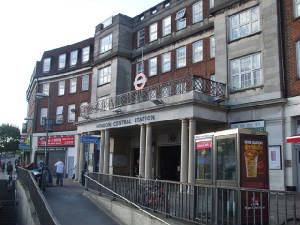
|
| Today Hendon... |
Posted by John Blacksmith at 16:48
Sunday, 19 September 2010
Mr Mitchell's career began when he went for his job interview at the Hendon and Finchley Times as
a trainee reporter in 1982. The editor who took him on, a Mr Dennis Signy, wrote about the occasion many years later, with
Clarence, courtesy purely of his share of the lottery ticket that was Madeleine McCann, at the height of his dubious pomp.
Before that hardly anyone seems to have noticed this grey and maladroit figure very much, even when he was a television news
reader.
It is a brief, piquant document which fills in one or two of the blanks in Clarence's biographical
notes, though not quite in way the latter might like. Mitchell himself speaks of his ex-editor Signy with warm admiration,
a rare offering from a personality who doesn't do influences and with about as much warmth as a leftover supper, but Signy
doesn't quite reciprocate: even after twenty five years he can't bring himself to say that he liked his protégé
and nor can he resist the temptation to aim sly barbs at the over-filled balloon of Clarence's self-invention.
No wigs today
One can picture callow Clarence sitting there in tight-fitting suit and strangling collar,
"pleasant looking" according to Mr Signy but with hair that "seemed to stand upright". The editor seems
to have been vaguely provoked by his appearance,for he issued the mysterious edict that, should he get the job, he would be
expected to wear clothes suitable for "meeting Margaret Thatcher...or the lowest paid worker on a picket line."
Signy, who clearly enjoyed bullying young interviewees, was, however, impressed, and rightly. Clarence was "bright",
though academic qualifications of any kind are nowhere mentioned, and his dogged and lonely ambition to succeed at something,
anything, was visible even then. His background seems to have been an excessively ordinary, rather than deprived, one with
Signy noting that Clarence lived with his parents in a house between "Brent Cross and Golders Green," not at all
a poor area, if a gratingly anonymous one, to which Signy adds slyly that "it adjoined the Northern Line."
Mitchell's deliberate vagueness about his early life, in fact, seems to be based on perhaps the most significant aspects
of his personality: his acute dislike of being merely ordinary – which is how most people in his life have seen him
- and his conviction that he has hidden strengths which the outside world tends not to appreciate. Neither characteristic
leads to great popularity among one's peers. Both are connected to his compulsion to paint himself in stronger colours
than the sitter actually merits – in short the spinning begins very much with himself.
A secret
ambition
Perhaps in response Mr Signy gives his current take on Clarence's notably brief "worked
in a bank after school but hated it". A bank post, as both he and the later Mr Mitchell know, might be merely a local
branch or something grander, a traineeship in a merchant bank for instance. Signy is having none of it: Mitchell, he says,
worked in a building society office in Hendon Central, not a bank, a worthy institution no doubt, but about as excessively
ordinary as you can get. As for "hating it", Mitchell told him that he intended to "become a [building society]
branch manager by the age of twenty five."
Mr Signy concluded the interview by turning to the question of
his name. "Bit old fashioned in this day and age", he said, "Clarry Mitchell is much snappier and modern".
But "Clarence" (for foreign readers the name is an absurd one to modern English ears, singing of Monty Pythonish
suburban pretension) was too important for our hero to give up. "My parents gave it to me," he replied, rather superfluously,
one might think, "they like it."
The Bureau has struggled to define what fictional character
Mr Mitchell, until his Madeleine ticket came up, so reminds us of. None of us could quite place it, except that he seems curiously
of another age. Mr Signy has solved the mystery and we can only fall back, with the reader's permission, on Wikipedia:
“The Diary of a Nobody, a Victorian comic novel, is considered a classic work of humour and has never
been out of print. It is the fictitious record of fifteen months in the life of Mr. Charles Pooter, a middle aged city clerk
of significant social aspirations, living in the fictional 'Brickfield Terrace' in Upper Holloway which was then
a typical suburb of the impecuniously respectable kind. The humour derives from Pooter's unconscious gaffes and self-importance,
as well as the snubs he receives from those he considers socially inferior, such as tradesmen.The book has spawned the word
"Pooterish" to describe a tendency to take oneself excessively seriously."
But Pooter will
meet the Pope
However one underestimates Mr Mitchell if one sees him only as Pooter, for here he revealed
what has helped take him, if not as far as he would like to go, a good deal further than he might have gone. Getting into
journalism without connections is very difficult, as Signy knew, which is why he was able to mock and intimidate the hundreds
of young hopefuls who appeared before him, usually desperately anxious to get their foot in the door. Despite this the young
clerk, with no experience, no charm and no apparent qualifications to edge him into the job flatly refused to change the name,
argued back with his potential employer and, as Signy concedes, won his point. It was an unusual and brave performance: the
name stayed.
And so did its owner. Signy took him on, adding that he later "distinguished himself as a news
reporter with many front page leads". Mitchell was out of the Hendon building society with his foot firmly on the first
rung of the media ladder.
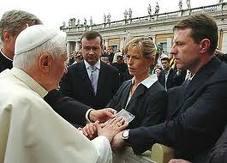
|
| ... tomorrow the world |
|
One of history's great war correspondents, 23 September 2010 |
|
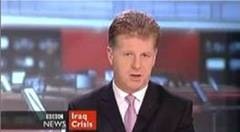
Posted by John Blacksmith at 17:21
Thursday, 23 September 2010
Mr Mitchell learnt his trade on the Hendon and Finchley Times for some three years. In 1986 he got
his second big break, when the BBC took him on, first as a radio reporter and then to work in television on the Yorkshire
news magazine Look North. For the next fifteen years he gradually worked his way through the vast BBC news and current
affairs bureaucracy, reporting and presenting the news.
From what we can judge Mitchell was a perfectly competent,
if rather – sorry Clarence! – ordinary BBC news man. Only his strong ambition which the BBC was unwilling
to satisfy - for Clarence's reach always exceeded his grasp - distinguishes him from any of the others. His own description
of these years is characteristically one dimensional, even allowing for the fact that he had gradually imbibed the language
and values, or rather attitudes, of the news and current affairs empire for which he worked.
One dimensional: about
the BBC he has nothing of interest to say. His colleagues do not exist. He cannot avoid embroidering his own achievements
in a flat, matter-of-fact, way. On the rare occasions he speaks of emotions he does so in a jarring and oddly distanced manner,
as if the right words are not accessible to him, only that large mental file containing what he thinks his response - to a
situation or an inquirer - should be.
Self insight is zero: Mitchell is acutely uncomfortable touching
on the self in any context: on the brief and rare occasions he does so he sounds disturbingly like someone discussing a stranger.
More noticeably than other media people, he attempts, awkwardly, to place himself in terms of the stories he has covered,
rather like a surgeon describing himself by the careers of the patients he'd operated on. It is all strange, as if within
the comforting swirl of ambition and activity there is only a void.
Perhaps Clarence is talking to that remote
self as much as to the rest of us when he describes his news career and how dramatic and adventurous it was. He stood in front
of a camera reporting not ordinary incidents but gory crimes and he also stood in front of a camera reporting bloody wars
– or so he tells us, though footage of the latter is vanishingly rare. Oh, and he was close to the centre of power,
since he sometimes stood in front of Buckingham Palace reading out a report on the royal household.
This self-portrait
culminates in Mitchell's final transformation from average hack to news hero: by the time he ceased reporting and became
a trainee news reader in 1999 he had risen, he tells everyone, to the key role of "fireman", dispatched by the mighty
BBC, like a journalistic James Bond, to "hotspots" where he – and by Clarence's not-so-subtle implication,
only he – was badly needed.
From the rather limited remuneration they gave him this appears to be
something of an, ahem, overstatement. The rest of the world too seems to have missed his fire fighting efforts. Kuwait,
Northern Ireland, the Balkans, says Mr Mitchell but there is no footage of the famous fireman receiving any awards for
his dangerous exploits in these places, no John Simpson-like archive shots of Mitchell shouting his reports as the mortar
bombs rain down around him.
And when the BBC let him go - without a struggle - there was no tear-stained appeal
from either colleagues or audience for his return. A search by the Bureau for public recognition of Mr. Mitchell's
achievements as a war correspondent, or even a face, resulted only in a fifteen second You Tube clip of him reading
the news many years ago, accompanied by the uploader's comment:
"What happened to Clarence? I remember
seeing him a few times in early 2005 doing overnights on BBC News 24/World."
He received one
reply.
As with Mr Signy we can turn to an outsider for another view of this glittering career. Laurie Margolis,
a BBC reporter himself, is the second person after that worthy to have noticed our hero in his earlier incarnation. He too
wrote about the man only after his Madeleine lottery ticket had come up. Margolis was still working for the BBC as he wrote
and one can almost sense his desperation to find something interesting to say about this grey shadow, this raincoat hanging
on a peg. He testified without enthusiasm to Mitchell's competence and his having worked on various big crime stories
during his broadcasting career - but the dramatic deployment of Mitchell to world hotspots as a "fireman" and war
correspondent somehow passed him by; indeed he stresses that the stories in which Clarence was a "major figure"
were only domestic ones, not overseas.
Like Signy he cannot utter the magic words "I liked him"
and like Signy also he feels the irrepressible need to reach for his hatpin: his list of the "major figure" stories
carries a bitchy hint that his ex-colleague has a slightly unhealthy interest in violent or perverted crime, and he is
our source for the unfortunate, and now famous, incident when Mitchell fell asleep and failed to read his scheduled late-night
news bulletin. He adds mildly that his colleague "never quite made it" as a presenter.
Margolis said
of Mitchell's appointment by the McCanns, that he imagined Clarence was content in his new role as the family's
voice since "he's centre stage on a huge story, intimately involved as ever, and on television and in the papers
all the time."
Not quite the way that Clarence himself would describe it.
|
I showed them!, 24 September 2010 |
|
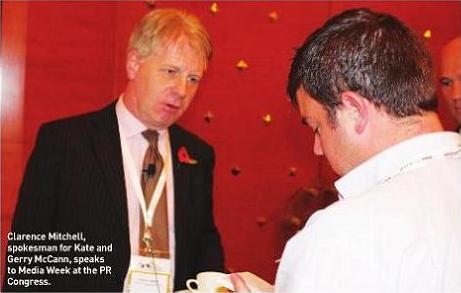
|
| Note the eyes, not just the thatch |
| |
Posted by John Blacksmith at 15:04
Friday, 24 September 2010
In all big organizations the high fliers start to pull away from their contemporaries in their forties. The remainder are
thinned out or left hanging until they accept life in the backwaters or seek a future elsewhere.
Mitchell, as we
have seen, was a competent operator, a safe pair of hands at a middling level, but his way was blocked. He was not being groomed
for a senior role and his increasingly strong desire to get out of news journalism and into big-time national news reading
or programme presenting was being met with studied indifference by the BBC. Anyone except Mitchell himself might have seen
that his was a hopeless ambition now: his appearances on screen had failed to build up viewer loyalty and his age, increasingly
odd appearance and uncomfortable body language could hardly be less suitable for a role in the nation's sitting rooms:
there his presence was neither sexy nor comforting. His other potential route to prominence, promotion to royal correspondent,
was also blocked by the ever-younger looking Jenny Bond.
Mitchell got the message and began looking for another
job. He had nothing to be ashamed of as a middle ranking journalist, though his salary was poor in media terms, and there
were no real black marks in his BBC career. But he was getting on and it is notoriously hard to move to another television
company at that age without a big, established reputation. His weakness and lack of flair as a writer prevented him from going
for the real money in print journalism – feature writing - and, despite all the contacts he'd made in the media
world, there was no Big Phone Call for Clarence. Mitchell – the "adventurer and war correspondent" - opted
for the cosy security of a journalism job in the government civil service.
The now famous Media Monitoring Unit
was the modern equivalent of the old press cuttings digest which every large organization and any government has needed since
the rise of the modern press (the BBC itself, for example, has a media monitoring unit). In the past a few juniors, usually
supervised by elderly ex-reporters or PR men at the end of their careers, sat with scissors in hand cutting and pasting press
stories into volumes for circulation to other departments. Television and computers, of course, changed all that: now a series
of juniors sat in front of monitors abstracting the stories.
Mitchell's compulsive exaggeration of his own
importance reached its peak when spinning his MMU work: outsiders, many of them in Portugal, have grasped at Clarence's
studied myth - making to believe he was a "government figure" with the ear of the prime minister, a sort of Big
Brother of censorship working from the shadowy vaults beneath 10 Downing Street, sent - as a "fireman" no doubt
- by the prime minister to put the lid on the terrifying revelations that might result if the McCanns were not handled properly.
Where does one start? Certainly New Labour was obsessed with media relations, as all democratic governments now are,
and had increased its media budget accordingly. But the attempts to bully the media – which had all failed – were
virtually over by 2005 and had, in any case, been carried out by trusted cronies of the prime minister like Campbell, not
by the minor apparatchiks at the Central Office of Information, the government's long standing media and PR arm. The MMU
was not an executive department: its responsibility was merely to browse, record and present the key stories of the day in
short printed form. A news-aware journalist needed to be in charge of the team in order to highlight which stories might be
rising or falling.
Certainly also the MMU received a boost of a sort with Gordon Brown's accession since, as
his erstwhile colleagues have begun to reveal, he was obsessed with his media coverage to the point of near-madness: Brown
began his working day by biting his nails over the latest stories and minions like Clarence were expected to make "bloody
sure" that a summary of them was waiting on his desk.
And that was the extent of the job. Despite the hints
and claims of Mr Mitchell, he had no executive responsibilities for media relations or management at all. He was not permitted
to contact the media to influence news editors or anyone else: his job was simply to ensure that the paper landed on the appropriate
desks on time.
It should hardly be necessary to add that his appointment as media liaison for the McCanns in late
May 2007 was not a political one, had nothing to do with Blair, Brown or any other minister but was a civil service –
administrative – move when a media person was needed at short notice. There is only one mystery outstanding about his
posting to Portugal, and that will no doubt will be solved in due course: was he given the work because his absence would
hardly be noticed, let alone regretted?
Given Mitchell's self-spinning it is not hard to see why the myth of
his power and influence has survived and, in some quarters, will continue to survive. Mitchell made no attempt to deny the
nonsensical claims made about him, judging, correctly, that they would work in his favour. One example only, a template for
all the rest: in an interview with a rather excitable overseas magazine Mitchell described the MMU as a government department
which helped manage the news. By his standards this was harmless enough but it was mistranslated as "control"
the news and has caused uproar ever since as a verbal slip in which the Grey Eminence let his guard down for a moment and
revealed his true, sinister, role. Mitchell has been quite content to let it stand.
That anyone should have found
anything mysterious about his transition to paid spokesman for the McCanns is equally surprising. All Mitchell's thwarted
dreams of the past quarter of a century were fulfilled in a rush by the Madeleine lottery ticket in May 2007: with his
known and attested qualities - his constant desire to be somehow "involved" in news stories, his childish pleasure
at being the centre of public attention, his love affair with being on-screen, his fascination with violent or perverse crime,
his constantly cheated ambition to be a "big player" – could there be any question of going back to a grey
civil service job? Are you kidding? He was made for it and he knew it.
And Mitchell recovered that sense of his
own worth that Dennis Signy had noted and which had been draining away in the corridors and canteens of the civil service.
With the knowledge that Gerry McCann wanted him, he was able to state his terms – and there was no question of working
for expenses as his predecessor Justine McGuiness had done, however good the cause: he wanted what he called "his package"
from the civil service to be matched. That achieved, courtesy of Brian Kennedy, he took up the role.
His performance
is a matter of record, save for the bits which Mitchell, still not a wealthy man, is saving for his other pension, his memoirs.
It only remains to assess his achievements.
|
A criminologist writes, 14 October 2010 |
|
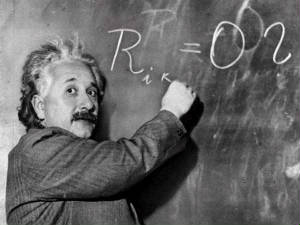
|
| Not quite that one |
Posted by John Blacksmith at 18:33
Thursday, 14 October 2010
Our guest this week is an English academic criminologist based in the states, author of Why profilers are always wrong
and consultant to Bull Diamond Investigations of Los Angeles. Known in the trade for their cracking of a murder and stalking
case involving Scotland's most famous rock and roll star some years ago* Bull Diamond have a remarkable investigative
record. Pity the McCanns didn't use them rather than their menagerie of conmen and lunatics. But then BD would never have
taken the job. The report is rather dry but worth the effort - for those interested in the approach - since its conclusions
are pretty unarguable.
* No Stone Unturned, by Antony Sharples, a study of the case under the guise of
a comedy thriller (for legal reasons) is (for legal reasons) only available in the UK from Lulu.com. Worth a read if you've
a sense of humour, or love rock and roll. Now, the dry stuff.
Truth value, the McCanns and the investigative
process
Hi. I'm sorry but there's no really simple way of explaining this stuff. That's because
criminal investigation isn't a game or a television series: at all times it involves matters of life, liberty and, often,
death. And it's very rarely simple. Anyway, here we go.
From the scientific standpoint evidence-based theories
can be tested for truth and explanatory value in two ways, by experiment and by predictive power: a true theory makes more
correct predictions than a false one.
In criminal investigations, for obvious reasons, we scientific people only
have predictive power as a measure. Let's apply it to our Madeleine case and the two opposed theories. The pro theory
– OK, OK, I'm generalising, but life is short – goes roughly this way:
P [stands for pro, not
proposition] 1. Kate & Gerry are truthful witnesses of events.
P2. They described an abduction.
P3. Eye witness Jane Tanner's sighting was almost certainly the fleeing abductor.
P4. There's no evidence
of any observed suspicious or unusual behaviour by the parents in PDL.
P5. The police investigation was a mess,
if not corrupt, and its conclusions are worthless.
P6. So it was an abduction.
In the opposite corner...
A [Guess what that stands for] 1. The police investigation was reliable.
A2. They signed off saying
the child was not abducted and probably died in or around the apartment on May 3.
A3. The parents are not truthful
witnesses of events.
A4. Jane Tanner is not a reliable eye-witness.
A5. There is no evidence of abduction
beyond the claims of the parents and Jane Tanner.
A6. Therefore... no abduction and the child is dead.
Predictions
A prediction is not a suggestion or a guess. It's a firm forecast, capable
of what we call refutation, derived from the theory which is, in turn, derived from the evidence. The following
unrefuted, predictions were made by various representatives of the two sides in summer 2007 and at intervals since.
Pro:
PP1. The parents will not be convicted of any involvement in the disappearance of the child
since there is no evidence of their wrong-doing.
Anti:
AP1. There will be no sightings
of Madeleine McCann.
AP2. The child will never be found alive.
AP3. Private detectives will find no
evidence of abduction.
AP4. There will never be supporting evidence for Jane Tanner's "sighting".
Did we manipulate the predictions? Forget it. Out of kindness we've left out the refuted ones from both sides
but there were never that many (for sheer lunacy let's make an exception for the Metodo mob's "home by Christmas"
classic, even though Metodo were too cynical to be pros themselves). The 2007 forum and press records are available for you
doubters to check, I guess, but who wants to read that stuff again?
But are they really valid predictions?
Well, check for yourself and, while you're at it, see if you can find more, especially since the pro beast looks a bit
starved and in need of a good meal, but remember they must be "derived from the theory". Can we fatten
up the Pro-Prediction beast and predict, say, that the child will be found alive, to counter AP2?
No, the
abduction theory as stated cannot make such a prediction. OK, "evidence will emerge to confirm Jane Tanner's
veracity" – how about that? Nope, that's a hope, not a prediction from the theory. What about "private
eyes will uncover some tiny evidence of the abduction"? No again: have a look – where and how does the
abduction theory lead to such a prediction? It doesn't. Now look again at A6, "the child is dead." The prediction
"the child will never be found alive" is generated by the theory itself, not as a suggestion by someone holding
to that theory: understand that bit and you're most of the way there. All four AP predictions are of this self-generating
nature, like them or not. Have a look at them again - can you see?
We have a huge 4:1 imbalance in so far unrefuted
predictions between the two theories. That is because of the even greater difference in the total information content of the
two, what we call explanatory power. The pro theory cannot provide enough predictions of value because it contains insufficient
data behind it to generate them: it is not necessarily a false model of what happened on May 3 but it is certainly an inadequate
one. And this is where theory and theories – bang! – meet real life. The inadequacy of the theory, the
model, is the only reason the PJ couldn't run with it, even if they'd wanted to – because it leads nowhere:
virtually zero predictive power means no potential to move an investigation forward.
And that's
the real reason why the Portuguese authorities - who, believe me, know plenty about the academic science underpinning investigations
- ignore all the parental pleas for another investigation. Look at it this way: the authorities – not just the cops
- are saying that if the parents want the case re-opened then they and the seven friends are going to have to get on that
plane to Faro for intensive questioning to get things moving forward, otherwise forget it. Given that agreement then bingo,
the PJ can go into action – picking a team, picking up phones, assembling the questions, analysing and cross-matching
the data and so on. As a result – here comes the science again - the information content of the investigation must increase,
and not necessarily to the detriment of the McCanns either.
But re-opening from the viewpoint demanded by the parents,
which implicitly means no questioning of the nine, is another matter. Where to start? Information content zero, remember.
All right, assemble a team, then what? Pick up the phone. To whom? Put together some questions, sure – who are they
going to face with them? Follow the abduction trail, then – but there isn't one, it ends fifty yards outside apartment
5A, no CCTV, no further eyewitnesses, no airport records, no forensics, no trail. Follow the suspects – but there isn't
a single suspect who can be connected to 5A to follow.
Just how, in practice, would the police go about strengthening
Jane Tanner's veracity, rather than weakening it? And if the parents are perfectly truthful, as the pro theory states,
then they clearly have nothing to add to their accounts of May 3 so there's nothing to ask them - again, no trail to follow,
no pieces to pick up. So what can they do? Well, take the assembled team, sit them on their asses and have them go through
eleven thousand pages of case files again looking for "overlooked" clues. And appeal to the public for further information.
That's it. Big deal.
So our airy-fairy academic look at two opposing theories ends very much in the real world.
And it ends, also, in a paradox. The only way the McCanns can ever get the Holy Grail of exoneration for themselves and their
kids is by going along with a new PJ investigation on anti-lines! Because, for scientific reasons, it's the only game
there'll ever be in town. You need to chew on that, Gerry and Kate.
|
He made it, 22 October 2010 |
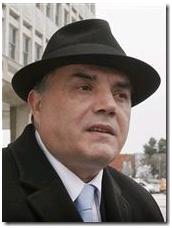
Posted by John Blacksmith at 15:14
Friday, 22 October 2010
The first thing to say about the appeal verdict is that it represents a personal triumph for Goncalo
Amaral.
Yes, he has had a dedicated band of volunteers, chiefly in Portugal, assisting him with appeals for legal
funding and offering strong moral support; yes, he has had lawyers to represent him and the vocal support of some ex-police
officers. But it is Amaral and Amaral alone who has risked absolutely everything since writing his book, "to recover
my good name," as he said, "which was publicly sullied while the institution that I served for 26 years, the PJ,
did not allow me to defend myself." In pursuing that matter of honour he triggered a nightmare of dubious criminal accusations,
disgusting, indeed almost unbelievable, insult and abuse and a determined and well-financed attempt by the lawyers of
two countries and their clients literally to destroy him, a campaign which came perilously close to succeeding and which
really was, for once, like something out of Franz Kafka.
From the sidelines distant well-wishers such as
we at the Bureau have been free with advice and, on occasion, criticism, the latter prompted by the belief that Goncalo
Amaral might be underestimating the forces against him and fears for his capacity to survive the onslaught (only when this
affair is at an end will the public discover just what Amaral's family have suffered). The Bureau was wrong:
Goncalo Amaral and his family have survived and his way of doing things has been vindicated. It is an extraordinary achievement.
Now, the verdict. The human rights aspect has been dealt with elsewhere and we won’t repeat it. What we want
to highlight are the implications of the rest of the judgement: they are much worse than the McCanns could possibly have expected
and that is why the pair have been unable so far to formulate a response.In clear and unambiguous language the judgement
plants a stick of dynamite under the entire McCann case as presented to both the public and the legal system since July 2008.
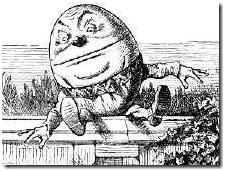
When those two good Catholics, Kate & Gerry McCann, are
safely tucked up at night, dreaming perhaps of the merits of Christian magnanimity to one's enemies, there may well be
a bible under one pillow. And under the other? Probably a copy of their other holy book, the Prosecutors' archiving report,
the Humpty Dumpty report as the Bureau has described it.
The McCanns, their lawyers and their associates
have staked everything on making it the mainspring of their cause, as we have chronicled in our previous posts. Its misuse
began with a pre-emptive strike by the parents and the loathsome Mitchell when, in July 2008 before the document had been
translated in the UK, they fed grossly distorted extracts of it to the UK press, extracts which, to their everlasting shame,
mocked the efforts of the policemen who had searched for the McCanns' own flesh and blood.
Faced with the Truth
of the Lie and the situation that a failure to sue Amaral would be taken as an admission of guilt the search was on for
a firm basis for libel actions. It was found by using the fact that in the UK and most other countries a previous criminal
court verdict is accepted as definitive: the trial evidence can be quoted but it must be done fairly and without any attempt,
for example, to cast doubt on an acquittal, otherwise it is an open and shut libel.
With the contempt for the Portuguese
that has characterised all their efforts so far, oh-so-clever Team McCann hi-jacked Humpty Dumpty for its own purposes. Their
lawyers equated the prosecutor's (civil servants') report with a judicial (courtroom)
finding of guilt or innocence thus providing, they hoped, the same cast iron protection as a courtroom acquittal.
It was, of course, a bluff but a very powerful one because of the potential legal costs of proving them wrong. Nevertheless
they buttressed this sleight of hand with the further claim that the report was both the objective summation of the investigation
and, based on the evidence, an official and definitive dismissal of of the case against them.That is how it has been
used ever since.
Until last week, that is. The McCanns can reach under their pillows and chuck the report in the
bin: the verdict of the judges has blown the fib away, as we shall show in the next posting.
|
Usually an ass but not always, 22 October 2010 |
Usually an ass but not always The Blacksmith Bureau
Posted by John Blacksmith at 16:49
Friday, 22 October 2010
The judges begin by describing the three main grounds for the appeal: the claim for freedom of expression under
the Portuguese constitution [which has been described elsewhere since the verdict JB]; the second claim that the
facts in the book were "mere reproductions” of the investigative data and the third, that those same facts were
"even part of the Prosecutor’s report."
All three claims are accepted at the end of the judgement.
They summarise Amaral’s theory, with no weasel words and nothing for the McCanns to pick out and spin: in the
book, they say, Amaral defends the theory that the child died in the apartment on May 3, that an abduction was simulated,
that the parents are suspected of concealing the body and that there was child neglect.
They then turn to the individual
himself, someone that the legal system has until now shown every sign of treating as a non-person: Amaral. The judges remind
us of his reasons for writing the book and quote: "Later on, I was removed from the investigation. I then decided that
it was time for me to defend myself in a public way. Therefore, I immediately requested my retirement, so I could regain the
plenitude of my freedom of expression."
The judges add that it is "important" that the author feels
he is the victim of injustice and wants the truth, or at least his version of the truth, to come out, especially since he
felt his honour was in question and he was not allowed to reply in his own defence. With considerable understatement they
add that this is not a minor point.
In the book, they say, Amaral presents a multiplicity of facts from the investigation,
all of which are in the DVD and which are evaluated in the Prosecutors' report. In this multiplicity of facts some are
primary, some secondary: Amaral evaluates and weighs them accordingly, from the standpoint of someone with 26 years experience
of police investigation.
Amaral, say the judges, describes in the book, in detail, a number of apparent facts and
situations that from the outset of the investigation were not compatible with each other leading to contradictory conclusions.
They confirm that these reservations were not in opposition to the Prosecutors' report but were essentially the
same as those given by Humpty himself – by immediately turning to and quoting from his report: "From the analysis
of the depositions that were made, [runs the report] it became evident that important details existed which were
not fully understood and integrated, which needed to be tested and verified at the location of events, thus rendering it possible
to establish the apparent failures to agree and the lack of consistency in a suitable investigative form: the reconstruction.
This could not be carried out, despite the commitment that was displayed by the Public Ministry and by the PJ, ..." [my
translation JB]
The judges then turn to the dogs, quoting not from the Truth of the Lie but, once
again, from the Prosecutors' report. The findings of Eddie and Keela are given in some detail.
Having done
so the judges add that the combination of the inconsistencies and the performance of the dogs was enough to constitute making
them arguidos [there is no mention of "haste" JB]. As far as the dogs are concerned they state that forensic
evidence, as we know, did not corroborate their findings; as far as the contradictions are concerned the Portuguese authorities,
Justice ministry and PJ tried to perform a reconstruction but failed due to the lack of availability of the McCanns and their
friends, leaving those contradictions still unresolved.
Here, once again, they quote not the Truth of the Lie
but the Prosecutors' report, [you know, that document that clears them] in support of what Amaral claims:
"(…) despite the fact that the national authorities took all measures to render their travelling
to Portugal possible, due to motives that are unknown, after the many doubts that they raised concerning the need and the
opportunity of their travelling were clarified several times, they chose not to show up, which rendered the diligence impossible
to perform.
We believe that the main damaged party were the McCann arguidos, who missed the possibility to prove
what they have protested since they were made arguidos: their innocence towards the fateful event; the investigation was also
hindered, because said facts remain unclear (…)".
Now, the killer blow and here we will quote the judges
in full:
"What is certain [our italics JB] is that since the start of the investigation, there were
incongruent and even contradictory situations concerning the witness statements, the telephone records of calls that were
made and received on mobile phones that belonged to the couple and to the group of friends that were on holidays with them,
the movements of people immediately after the disappearance of the little girl was noticed, concerning the state in which
the bedroom from where the child disappeared from was found (closed window? open window? partially open window?), etc., and
the mystery would only become even thicker due to the clues that were left by the aforementioned sniffer dogs."
Note the phrase: "what is certain".
Killer blow number 2:
"Where Amaral differs from
the Prosecutors who wrote the dispatch, is in the logical, police-work-related and investigative interpretation that he [Amaral]
makes of those facts."
And number 3:
We need, the judges say, to stress the following: the facts
that led to the applicants' constitution as arguidos within the inquiry were later on not sufficiently valued by the Public
Ministry's Prosecutors to lead to a criminal accusation, but those very same facts, seen from a different angle,
may lead to a different conclusion from that of the prosecutors.
Suggestive data ("indications") that
were deemed to be insufficient in terms of evidence in a criminal investigation, can be appreciated in a different way, in
an interpretation that can legitimately be published as a book, as long as the interpretation does not offend any fundamental
rights of anyone involved. In our view that said interpretation does not offend the applicants' rights."
Costs were awarded against the McCanns.
The full implications of the judgement are going to take time for all
parties to evaluate fully. But the claim that the Prosecutors' report was a finding of either guilt or innocence
is dead: it is an interpretation of the evidence of no more validity than that of Goncalo Amaral, perhaps – given, as
the judges say, the experience and ability of the inspector – even less.
The verdict makes it quite clear
that the burden of legal suspicion has not been lifted from the McCanns by the archiving report. And, by quoting the report
in its relevant passages, the judges also show that the failure of the Tapas Nine to co-operate in clarifying the events
of May 3 was, and remains, central to the investigation.
The TM lawyers – who have to be paid
- will no doubt be studying the judgement – whose translators had to be paid - very carefully, in liaison with Shrieker
Duarte, who has to be paid. Where will the Dirty Pair go on getting the money? In the UK last week the famous Liverpool football
club court case which involved virtually no preparatory work and ran for a mere few days had costs awarded against the losing
party of around one hundred thousand pounds per day. Goncalo Amaral, God preserve him, has already faced the problems
of trying to defend himself without any available funds: it may well be the McCanns' turn next.
|
Dear, dear, 24 October 2010 |
Dear, dear The Blacksmith Bureau
Posted by John Blacksmith at 21:54
Sunday, 24 October 2010
At the
Bureau we no longer bother with the media much these days. Why? Because as far as the Madeleine McCann case is concerned it
is quite clear that they will always follow, never lead. The fond hope of the internet forums that the media will somehow
"break" the case, either by digging up new facts or by bringing news of significant events to the public that will
somehow turn the population against the Dirty Pair is, in our view, just another illusion.
There is no secret injunction,
no shadowy political protection, no ban by the Murdoch group. We don't believe there ever was interference from the UK,
come to that, no, not even from Ambassador Buck, that charming and, above all honest, civil servant, but that's another
story. The media are quiet because, despite the myths, they have all along responded to events, not initiated them, and at
the moment nobody is trying to use them. Not even the McCanns.
The media did not make the Madeleine story: Gerry
McCann did that, using them in such a professional way that media people are still locked in admiration for his achievements.
When the PJ, its suspicions growing, began itself to use the media, by selective leaking, the press dutifully defamed the
pair, covering themselves, as they thought, by allowing sob-sister "we've all done it" pieces to sit alongside
the libels. That came to an end in October 2007 when Brian Kennedy's money – you got it wrong Brian - allowed the
assembled support team to be next in line to use them, with writs, threats of writs and a propaganda offensive. Kennedy's
tame lawyer, Smethurst, was, as we know, frank about this episode, saying on Panorama – which of course he and his colleagues
were using – that their aim was to "expunge" the idea of parental guilt from the public's minds.
That period ended in July 2008. With the publication of the Prosecutors' archiving report the Portuguese, with one heroic
exception, washed their hands of the case. Nobody save the McCanns wanted to use the media any more.
That is how
the modern media works: it responds to whoever is trying to use it most effectively. Yet the myth of the investigative, digging
journalist, the Woodward and Bernstein crap, persists, along with the bizarre habit of quoting "news" stories as
evidence, that "they" know more than "we" do.
This was brought home over the last few days
when a junksheet called the Algarve Resident was quoted by the dwindling number of boobies who believe in the McCanns as "evidence"
about the Amaral book verdict. The AR, like its sister papers in Portugal, is for UK expatriates who are too thick or lazy
to learn Portuguese; it is a pure scissors and paste job copying news stories from the UK press (because they can't speak
Portuguese either). In this case they copied and pasted the Guardian – who had taken the story, since they haven't
yet seen the judgement - from the Portuguese press!
The Guardian hasn't seen the judgement because it hasn't
been officially released. Even by printing the little they did they were taking a chance since their lawyers, lacking a copy
of the judgement, have been unable to guarantee that the paper's report is a fair and accurate assessment. The rest of
the media are in the same boat: without a full copy they would be wide open – and rightly, under UK law - to action
from Carter Ruck.
For the verdict makes no immediate difference to libel in the UK. If the Truth of the Lie was
published in the UK tomorrow the fact that it has been cleared for sale by a Portuguese court would not help in the slightest
against a libel writ.
Ah, but there’s the rub: "immediate". Because, boy, will it do so in the
future.
We dealt with the appeal court judgement in two posts. One, titled "He made it", dealt with the
dependence of the McCanns and their lawyers on the Prosecutors' archiving report to succeed in any libel case against
Amaral, whether here or in Portugal.
The excerpts we gave related specifically to that preceding post. They were
the evidence and justification for our claim that:
1) The McCanns' libel claim is based almost entirely on
the Prosecutors' report.
2) The verdict destroys any chance of using it as a statement of truth or a legal
finding of innocence. It is not a statement of truth, the judges state, it is an interpretation, something quite different.
We have no intention of getting the volunteers who make up the Bureau into trouble by quoting the entire verdict verbatim,
much though our enemies would wish it, just as we never betrayed the trust of the various people who provided us with the
case papers, the rogatory interviews, the Scotland Yard decisions on officer de Freitas and, oh yes, the Tanner Murat court
case. All them before the media got anywhere near them.
The full verdict will be available soon enough and then, as always,
people can make up their own minds.
We have no hesitation in repeating, without any hopes or illusions, that the
verdict destroys the chances of the McCanns winning a libel case against Amaral. But, friend or foe of the Bureau, don't
take our word for it: ask yourself the question – when did Team McCann ever fail to have a comment ready at critical
stages of the affair? When was that disgusting, bewigged, liar Mitchell unable to respond? Until last week it hadn't happened
since May 3 2007. That tells you all you need to know about how serious, or rather lethal, is the setback they have suffered.
|
The stick of dynamite, 26 October 2010 |
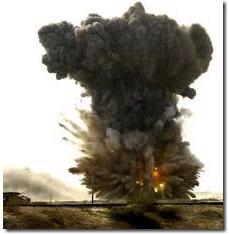
Posted by John Blacksmith at 18:25
Friday, 26 October 2010
We stated that the appeal court judgement planted a stick of dynamite under libel claims against Goncalo Amaral
by the McCanns both in Portugal and the UK. That was because, we maintained, the team have based their entire claim on the
notorious prosecutor’s archiving report. Not only does that report have fatal weaknesses and contradictions in it but
it has also been deliberately misrepresented by the McCanns and their lawyers. Under legal scrutiny both the misrepresentations
and the contradictions have been partially exposed, and the process will continue as the various documents come under further
judicial study.
So is there any evidence for those claims of ours and our conclusions?
The contradictions
& the "exoneration"
The details are in a number of our previous posts. Broadly, however,
the conclusions of the report cannot be reconciled with the police evidence on which it is based and the claim that it exonerated
them cannot be sustained.
The prosecutor states not that they are "exonerated" or "cleared"
– only a judicial body such as a court can do that – but that there is "no evidence" of their wrong
doing. The report itself makes clear, however, that the McCanns helped ensure that the evidence was incomplete by
refusing, along with the Tapas 7, to co-operate in clarifying the events of May 3.
Under those circumstances it
is impossible to clear them as the report itself acknowledges by saying that in failing to attend the clarification and reconstruction
exercise they lost the chance of exoneration. Come on folks, even supporters of the McCanns – if he says they
lost the chance of exoneration ("proving their innocence" in the English translation) then they can't have been
exonerated (or "proved their innocence"), can they?
In court in Lisbon earlier this year the prosecutor
– who cut a dreadfully unconvincing and unreliable figure - further weakened the exoneration claim by stating that the
parents had not checked on all the occasions that they claimed, in other words they had not told the investigators the truth.
The more the the archiving report comes before the courts, whether via further appeals or in future libel hearings, the more
credibility it will lose, exactly as contradictions in witness testimony are eventually exposed in court.
The claim,
by the way, made by supporters of the McCanns that the parents never actually refused to attend, is based on either ignorance
or dishonesty. The parents made it clear in a BBC radio documentary broadcast on April 26 2008 – and made while the
requests for co-operation were still being processed – that they would not return to Portugal in the foreseeable future.
"Interpretations" and misrepresentation
The McCanns have form when it comes
to dishonest misrepresentation, rather than misinterpretation, of the Portuguese legal system for their own purposes. On the
day the report was published the McCanns and their advisors helped their chosen feed, the London Evening Standard,
write a scandalously dishonest article about it.
As well as making the first known claim that the report "cleared"
the parents it claimed equally dishonestly that the same report also "mocked" and "lambasted" the Portuguese
police force for its inadequate investigation and criticised it for failing to establish proof of what had happened.
According to the story a "source close to the McCanns' legal team" added that the report established that
the police had "blatantly misrepresented" the evidence and that legal action against them was on the agenda. Mr
Frightwig himself confirmed his own story by saying that legal action against the police was indeed an option.
|
|
Jack Lefley in Portimao
05.08.08
The Portuguese police inquiry into the disappearance of Madeleine McCann was condemned in the strongest terms by the
country's public prosecutors, new documents revealed today.
Detectives were criticised for establishing "no
element of proof " about what happened to Madeleine or even whether she was alive or dead.
Public prosecutors
in Portimao overseeing the case said that none of the reasons her parents Gerry and Kate McCann were made official suspects,
or "arguidos", were ever "confirmed or consolidated".
Detectives were even compared unfavourably
with fictional sleuths Sherlock Holmes and Hercule Poirot as they were lambasted for achieving "very little in terms
of conclusive results".
Police tactics were revealed in a 20,000-page "Madeleine File", detailing
all aspects of the 14-month investigation made public yesterday.
Madeleine, three, vanished from her family's
holiday apartment at Praia da Luz on 3 May last year. The police file included pictures of the room and Madeleine's bed.
Her parents are now likely to take legal action against police in the country.
The case was initially led by top
investigator Goncalo Amaral, who last month published a book on the investigation entitled Maddie The Truth about the Lie.
The huge police dossier contained a report by public prosecutors Joao Melchior Gomes and Jose de Magalhaes e Menezes
about why the couple were not charged with any offence.
The report refers to the "objective circumstances"
which justify the "noninvolvement of the parents of Madeleine in any relevant criminal act".
It said
they were not in the apartment when Madeleine disappeared and noted their "normal behaviour adopted before the disappearance
and afterwards".
It said that "in reality, none of the indications which led to them being made arguidos
came to be confirmed or consolidated later".
"No element of proof whatsoever was found which allows us
to form any lucid, sensible, serious and honest conclusion about the circumstances" of Madeleine's disappearance
from the apartment ... including, and most dramatically, establishing whether she is alive or dead, which seems more probable."
It continued: "The investigators are well aware that their work is not exempt from imperfections.
"They
worked with an enormous margin of error and they achieved very little in terms of conclusive results, especially with regards
to the fate of the unfortunate child. This is not, unfortunately, a police story, a crime fit for the investigative mind of
a Sherlock Holmes or a Hercule Poirot, guided by the illusion that the forces of law and justice always restore order."
The report also revealed why the McCanns were not charged with "abandonment" of their children on the night
Madeleine vanished. It said the couple did not knowingly leave their children in any danger and had been "keeping an
eye on them".
It continued: "While it is a fact that Madeleine disappeared from the Ocean Club apartment,
the circumstances and manner of how this happened is not known. It is obvious that neither of the defendants, Gerald or Kate,
acted with intent ... they could not predict that the resort they had chosen to spend a few days' holiday would leave
the lives of any of their children in danger.
"It was located in a quiet place, where the majority of residents
are foreign citizens of the same nationality and without any known history of this type of crime.
"Although
they left their daughter alone with her siblings in the apartment, sometimes for extended periods, it's true that, in
any case, they were keeping an eye on them. We must also recognise that the parents are already paying a heavy penalty - the
disappearance of Madeleine - for their carelessness in monitoring and protecting their children."
The prosecutors
also rejected the theory that the couple had been involved in disposing of their daughter's body saying: "It would
be always left to explain how, where, when, with what means, with whose help, in a restricted space and time."
A source close to the McCanns' legal team said action against the Portuguese police was now increasingly likely. He
said: "Given this blatant misrepresentation of evidence, legal action against the Portuguese police is very much on the
agenda.
"The lawyers are considering very seriously whether action needs to be taken against individual officers
when evidence was clearly misrepresented in such obvious ways at such crucial times."
The couple's official
spokesman Clarence Mitchell said the priority was still the search for Madeleine but admitted legal action against the police
was an option.
|
|
So the written evidence is there – for use, we hope by Amaral's lawyers in any future libel
trial – that the selective distortion of this important document by the McCanns, their spokesman and "sources close
to their legal team" began on Day One and has continued ever since.
But Team McCann had, it seems, descended
into a dream world, apparently seduced into the belief by then that spin could accomplish anything: rather than just kidding
the British public with their dishonest and lying version of the report, they actually came to believe that the same tactics
would work in court – by founding their libel claims on it.
Have a look and see how total their dependence
is.
The empty cupboard
|
|
|
This is the letter which Carter Ruck sent out to the website GerryMcCannsBlogs and which the site owner
– thank you Pamalam – posted up. It contains virtually their entire case. In the second paragraph they state the
parents have denied all the libellous allegations made in the media and that – here it comes, folks - the Portuguese
prosecutor confirmed that there was "no evidence whatsoever" to implicate the McCanns.
Despite this,
they say, Goncalo Amaral has made "wholly unsubstantiated" allegations in The Truth of the Lie. "Mr
Amaral's views about our clients have been discredited by the court which found no evidence to support his
thesis whatsoever."
The site is given seven days to respond.
Well even the bluffers at Carter
Ruck could see that a claim using the Prosecutor's support alone was a bit thin. So what else did they come out with to
support the claim of libel against Amaral? They couldn't find a fucking thing. Not a thing. So they
invented – yes, Carter Ruck invented – the claim that the original Portuguese gagging injunction against Amaral
was a "Court Order" that Pamalam was breaching!
That was a year ago, October 30 2009. Pamalam called
their bluff about the court order but now it doesn't even apply to Amaral; the claim that the court has "discredited"
Amaral's allegations cannot now be made; and the prosecutor's report which "confirmed there was no evidence"
against the pair has been established as "an interpretation" by three judges.
The McCanns are said to
be in consultation with their lawyers. You bet. The dynamite has done its job.
|
Why not?, 27 October 2010 |
|
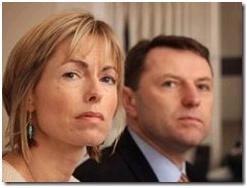
Posted by John Blacksmith at 16:21
Friday, 27 October 2010
The McCann strategy that has been in place since October 2007 – to silence the expression of all doubts within the
UK about their conduct, using all the resources at their disposal, has failed.
The McCanns have had undeniable
tactical successes in the last three years: using criminal lawyers to build a powerful defence to the Portuguese claims made
against them, suing or wooing the media, returning to the TV screens on both sides of the Atlantic to put their story across.
The British public show no overt animosity towards them, and the Portuguese, perhaps surprisingly, have shown little antagonism
on their increasingly frequent visits to that country.
The checklist
The Portuguese
police: roundly defeated.
The Tapas 7: silent or actively co-operative.
The UK media: brought completely
onside or silenced.
The UK police and courts: supportive.
The UK government & parliament: supportive.
The UK public: willing to live and let live.
The Truth of the Lie: unavailable in the UK.
And the price
There is one particularly notable omission from this list of triumphs: Madeleine McCann.
The "successes" of the parents completely exclude her. She has received none of the millions of pounds collected
and expended by them; the money is almost gone so she will never see any of it; nothing on that win-win checklist has helped
her in the slightest. All the victories relate only to the parents, not to her. Knowledge of her fate has not advanced one
iota since 10 PM on May 3.
The Portuguese police defeat was a defeat for the child. However understandable Kate
McCann's refusal to answer their questions, however fearful they might have been of the Portuguese system, in defeating
the police they took out of the game the body with the greatest knowledge and the greatest resources.
Their domination
of the media has served the parents well but not the interests of their daughter: since October 2007 none of the journalists
have made their own independent enquiries – which might, just might, have turned up something. The Tapas 7's
blind identification of their own interests with that of the parents has achieved nothing for the child. The steadfast,
if passive, support of the UK police and courts has, again, been of great value to the parents: what Lady Hogg et al accomplished
for the child is less obvious. And so it goes on, right through the list: every "victory" has been a defeat for
the parents' own flesh and blood.
Right at the bottom of the list we have the Truth of the Lie, whose
author, the supposed failure, the "disgraced cop" and persecutor of the parents, is the only person actually
working for the re-opening of the case in order to discover what happened to the child.
The parents are manifestly
not doing so, since despite their absurd calls for a supranational enquiry into the case, they have failed to take the one
action that could get it re-opened tomorrow morning: a statement that they and the Tapas 7 wished to return to Portugal to
assist the investigation unreservedly, without lengthy legal argument and negotiation, in clarifying the discrepancies in
their original statements: that would produce, one way or another, the "significant new evidence" required for a
formal re-opening. The efforts of the McCanns' own so-called "investigators", that rabble of crooks and failures
on whom the McCanns have lavished something like half a million pounds of Madeleine's money, are not even worthy of discussion.
But that is not the full extent of their failure. The strategy of ensuring their own freedom and either silence or
compliance with their opinions in the UK obviously implied that one day they and their other children would be left alone
to get on with their lives: all doubts about them "expunged", as the BBC was happy to allow nice Mr Smethurst to
say on their airwaves.
It is now over two years since the report came out that might have offered them closure,
about their own fate and reputation if not that of their child. With the developments in the Portuguese courts the likelihood
is that the libel case against Amaral cannot be fully resolved before 2012 at the earliest. Whatever happens the Truth
of the Lie will always be available over the internet. And there is nothing to suggest that a live Madeleine McCann will
turn up.
Everyone wins
Is this really what they want? Years and years more of the same
treadmill of struggle and the pus-filled enmity that seems to increase, not diminish, with time? The futile search for that
mirage "exoneration"? The same goldfish bowl existence for their children? The same battle to the end with Amaral
or, if he is defeated, another Portuguese police officer yet unheard?
The answer is there, staring them in the
face: volunteering to return to Portugal with their friends. Even looking at the worst possible case none of them would be
at risk: there is no real stomach amongst their critics to see any of them punished if they incriminated themselves in some
way.
Most people, and that very much includes the Bureau, simply want the doubts that they themselves
raised by their behaviour put to rest, without any desire for retribution at all. As against the downside the ultimate prize
is on on offer: the chance to show that Amaral's interpretation is wrong, genuine and lasting exoneration for themselves
and the friends, and a new direction for the investigation. As Rachael Oldfield said in another context, "well, everyone's
a winner really."
Isn't the twin prize – the chance of vindication and exoneration and the possibility
that their evidence might help resolve the case - worth it?
|
What stops them?, 03 November 2010 |
|
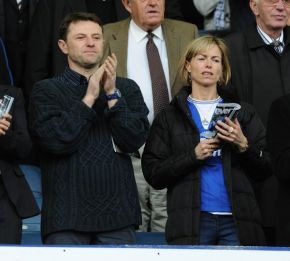
|
| My, my, what a difference... |
Posted by John Blacksmith at 13:16
Wednesday, 03 November 2010
Mrs Oldfield said: "We are more than happy to help the police with their ongoing investigation."
Despite their experiences Kate & Gerry McCann seem surprisingly ignorant of law. There is no such
thing – no mechanism, no legal basis, no money - as an international legal "review" of a national criminal
case: it is, for too many reasons to list here, impossible.
And it is quite unnecessary. Once again we return to
the question: when will the parents cease asking and start acting - to co-operate, finally, with the existing investigation?
What is it that prevents them from doing so?
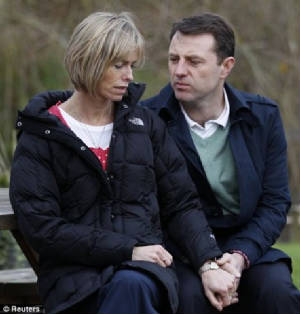
|
| ...a few days make |
"We are pleased that the investigation remains
so active and we are cooperating fully with the Portuguese and British police, as we have done since day 1."
Let us go back to that investigation, which is merely shelved, not closed. Why is it shelved?
"The
investigation will have a new coordinator appointed to replace chief inspector Amaral. We are happy to continue cooperating
with the Portuguese authorities."
When Rebelo took over the case and reviewed his predecessor's
work he was able to move in only one direction – the same one as Amaral.
He found not a single line of enquiry
regarding an abduction that led anywhere. The various private investigators - for what they're worth - who "reviewed"
Rebelo's work have found the same thing: no evidence of anyone outside Praia da Luz being involved in the disappearance,
no trail to follow.
After checking those within PDL including, of course, Robert Murat, (who, unlike the other
two arguidos, fully co-operated), only one practical line of investigation remained: the activities and evidence of the nine
people around Madeleine McCann on May 3.
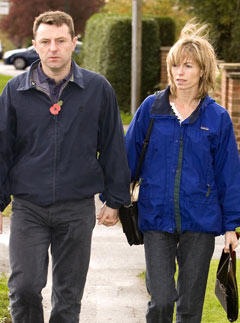
|
| ...it all depends... |
"We have always felt that the best chance of finding
Madeleine is through the police investigation."
Certain things were clear:
1) The
forensic evidence for either their involvement or exoneration was absent.
2) There were inconsistencies in their
evidence.
3) Arguido status for the parents meant they could not be compelled to co-operate in the search for the
child.
4) There was no legal basis for forcing the 7 to co-operate in the search if they did not wish to.
By November 2007 Rebelo's task, then, was straightforward: to find out whether the nine would co-operate voluntarily.
If they did so then the search for the child could move forward; if not it would be incapable – in the absence of any
other leads - of further progress. With nowhere else to go it would have to be shelved.
"On Saturday
we asked the Portuguese police if they had any objection to us coming back to the UK. We had assured them that we will continue
to cooperate fully with the investigation and of course will return as requested."
Despite their
protestations of co-operation the McCanns made no effort to return to assist. On the contrary: KM had already refused to answer
further questions and the pair were consulting expert lawyers in their own defence.
That left the question of whether
the 7 would co-operate voluntarily. Accordingly the rogatory letters were issued for interviews in the UK, which took place
in April 2008, with Rebelo observing. In those interviews the 7 made it clear that they had no stomach for returning to Portugal
to assist the missing child.
That was enough for Rebelo: he left even before the interviews were completed, having
already gained the answer to his remaining question. Before the rogatory interviews had been translated and analysed
he officially requested their assistance in a reconstruction and the answers he expected from the 7 were received in late
April.
On the basis that the evidence to help discover the child's fate was incomplete and that there was no
prospect of the 9 assisting in its completion he immediately moved to conclude the case.
That is how the Portuguese
search for Madeleine McCann – not the criminal investigation of the parents, but the effort to find out the fate
of the child - stands now: incomplete owing to the failure of the witnesses to co-operate - and therefore shelved.
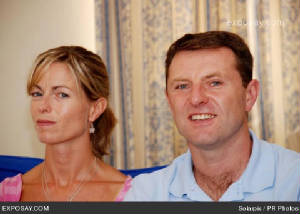
|
| ...on the pose |
The McCanns and their loathsome spokesman greeted the shelving with
mocking elation.
"BILTON: Have you been asked to return to be questioned?
JANE: No.
BILTON: Would you be prepared to?
JANE: Yes. Yeah of course we would. Yeah, and I mean if it helps to find Madeleine, be interviewed tomorrow, you know, we're
obviously key witnesses"
At any point the McCanns can get the search for their child re-opened
without asking anyone else to assist except their seven friends.
"Friends of the couple have now
indicated that they would refuse to return voluntarily unless they were formally cleared of any wrongdoing."
They can do it tomorrow. Why won't they? Why?
|
So which is the real one?, 05 November 2010 |
|
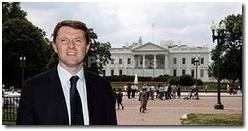
Posted by John Blacksmith at 16:54
Friday, 05 November 2010
When the debate over the McCanns' behaviour on May 3 was at its height the couple's defenders often put forward
the "modified profiling" argument.
Pure profiling – the claim that the probability of involvement
in a crime is scientifically linked to personality traits and evidence of past "criminality" - is, of course, a
pseudo science developed largely by the Nazis and unworthy of discussion. The "modified version", though, claims
that as worthy respectable citizens, professionals even, with no background of offending, the McCanns were intrinsically less
likely to have done something nasty on May 3 than "criminal types", you know, the sort of people like God-sent Mr
Hewitt or the various horror-film portraits of suspects at the Team's press shows.
Buttressing this argument,
as the somewhat unworldly Portuguese prosecutor pointed out, is the fact that the couple went on behaving as "normal"
people do all through that evening. Kate McCann would have to be a wicked simulator indeed to have acted normally knowing
that the child had already come to harm. And happy Gerry McCann, the loving parent who "romped" with his children
and their friends, who was beside himself with shock and terror at the loss of his daughter, behaving as David Payne said
"exactly" as one would expect after such a tragedy – was it really conceivable that this provincial doctor
had the qualities required to initiate and put into practice a nerveless cover-up in self-defence that night?
It
is an argument that has continued to appeal, though it is slightly weakened in Kate's case by her performances when posing
daily for campaign-led photo ops in the weeks after May 3, able to turn on with ease the role and expression requested by
the surrounding press pack - soulful, grief stricken, determined, stoical, lost:she was, they say, a "natural".
Still, nobody recalls her behaving in a ruthless or even unloving manner prior to 2007, let alone showing the sort of Lady
Macbeth-like qualities implied by the theories of the Portuguese police. No wonder that fair-minded people rightly find it
hard to accept the idea of her involvement in something chilling.
And the same goes for Gerry. When had anyone
ever claimed to witness the devious ruthlessness and suppression of all personal feelings needed to carry through such a plan
of deception? How could someone without any experience of crime and deceit suddenly act so decisively while presenting a mask
to the rest of the world?
While readers of the Cracked Mirror might pause, as the author did when writing
it, at the extent of the pair's apparent unknowability in earlier years, that is no reason to reject the argument.
But could the Truth of the Lie affair throw some light on it?
Once the book had been published
the McCanns made no secret of their eventual intention to sue Amaral for libel. Quite understandable too, if they were innocent,
as was an appropriate claim for damages: everyone has the right to defend a reputation under attack.
So Dr. Gerald
McCann took legal action against the man who had libelled him and his wife. The manner of his doing so, however, makes one,
again, pause for thought.
The parents were frank, via nice Ed "expunge it" Smethurst, that they would
seek an injunction in Portugal to silence his claims, preparatory to a full libel hearing. But there was no hint of the intensity
of the coming attack: instead there was deception, deliberately implying that their aims were moderate and defensive. "The
intention," said their spokesman in May 2009, "in suing Mr Amaral is simply to censure him. He has been publicising
his book across Europe and they just think enough is enough."
In western societies a libel case is normally
about the future suppression of the libel and financial restitution: it is about withdrawal and compensation.
The concept of personal retribution and vengeance for a non-criminal libel is not normally part of European
law. But the actual writ, as revealed in July, was certainly heading that way, not at all a matter of mere censure. Apart
from claiming a list of mental and physical ailments, apparently attributable to Amaral, that, if true, would have made them
unfit for work, even on the Oprah show, they wanted upwards of a million in damages and, as the lawyer Duarte made
clear, Amaral should be "punished."
And when the injunction was eventually granted at the second attempt
it was unprecedented, as we know, in the extremism of its attack on Amaral and his family's liberties rather than a "silencing"
of his claims. The McCanns had explicitly worked on and asked for these measures while, for public consumption, remaining
silent about their demands. Quite a performance and even Amaral himself, who has seen plenty of aggression and deviousness
in his career, was taken aback by the extent and venom of the onslaught.
No, we are not about to get the violin
out for Goncalo Amaral. Yes, people can argue that Amaral deserved what he got. But the question here, whichever side one
supports, is what does the history of the McCanns versus Amaral tell us about Gerry McCann, his abilities and his "profile"?
It is unarguable that the legal means adopted by McCann against Amaral have involved lies and deception ("we
only wish to censure" "we're here in Portugal to build bridges"), secrecy (masking the extreme nature of
his demands until the injunction was granted in September), ruthlessness (obviously) and indifference to human feeling (the
known grief and pain caused to Amaral's wife in particular).
So which profile of McCann does this performance
fit – the clean and harmless cardiologist of fond remembrance, "Good old Gerry", or someone quite different,
someone with a talent for secrecy, ruthlessness and indifference to human feeling when self-defence is involved?
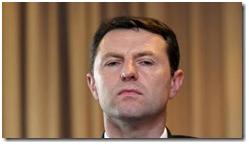
|
My, how things can move, 07 November 2010 |
|
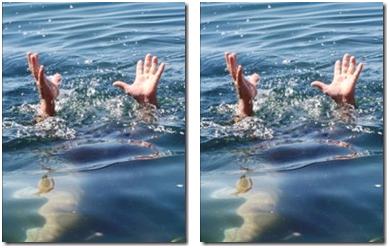
Posted by John Blacksmith at 22:18
Sunday, 07 November 2010
This blog began when we discovered that the witness list for the Lisbon hearings in January this year had the Dirty Pair
and their team staggering for the first time since October 2007.
There have been many ups and downs since that
week when the lights burned late into the night while the group struggled to think of something – anything – that
would help them cope with what was emerging. For the very first time the parents began to realise that amongst all the soap-opera
phantoms they and their group had created – abductors, paedophiles, allies at the heart of government, all that tawdry
Scouse fiction - there was somebody real: Goncalo Amaral was not only an enemy but a very dangerous one indeed. So dangerous
that they couldn't even discuss their deepest fears with Mitchell.
Always willing to help the Bureau pointed
out to interested readers – and they included the loathsome Coffin – that, yes, Goncalo Amaral was engaged with
them in a fight, a proper fight, not PR crap from people like Mitchell who'd only ever confronted real struggle as a voyeur
from the media sidelines, not battles for a bigger NHS hospital budget from provincial doctors but a genuine fight that really
– yes, really - was going to end with either he or they being destroyed.
The soap opera that they
created is now being pushed aside by a genuine drama: not the cheapo version of their deprived imaginations but something
as strange and disturbing as any No Country for Old Men script: a fight to the finish before our eyes.
And
just as they struggled and gasped in January 2010 now, as things move towards the climax, they are struggling again but with
fewer options and less hope.
The media suspect what is going on; some politicians have sensed what is happening
and are quietly backing away from the case.The Bureau has, shall we say, a feeling about what is taking place. The
supporters of the pair, however – there were 3 million plus of them when the fund was set up, 30 000 plus now –
are out of the loop: bafflement has taken over.
Enjoy Lisbon, Gerry.
|
Dear Keir Simmons..., 08 November 2010 |
|
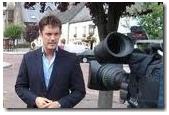
Posted by John Blacksmith at 14:39
Monday, 08 November 2010
"But why should two parents who have suffered so much continue to have this groundless campaign against them?"
So glad that you wanted some feedback and I hope that someone will forward this to you or twitter you the link. First,
by way of a taster, can I quote what the mayor of London wrote this morning about the BBC journalists' strike, which you
will note brought the country to its knees?
"I consume vast quantities of news – but almost entirely
without the assistance of the BBC. I get up early and read a fair quantity of newsprint, notably this paper and the FT. But
if I then switch on my computer and go to Google news, I can see what everyone is reading across the planet.
You don't have to wait and fume for a quarter of an hour while some egotistical journalist tries to skewer some temporising
politician. You don't have to worry about the bias of programme editors, because the sheer multiplicity of sources enables
you to shake out the bias and work out what is really going on. You can find it all out in your own time, and it usually takes
about five minutes."
That's the world you now work in, Mr Simmons.
I don't defend
any vile accusations made against the parents and I have no theory whatever about any involvement by them in the fate of their
daughter. I don't take part in internet forums or comment boxes precisely because of the incredible violence with which
people disagree. But that is nothing to do with the McCanns – it is a function of internet debate.
But are
you seriously suggesting that there are no important questions about the behaviour and veracity of the McCanns since May 3
2007?
You will recall, I'm sure, the shouted comment from a journalist on the Lisbon court steps early this
year, referring to the irrefutable evidence earlier that Goncalo Amaral was not a "rogue cop" but a person representing
the views of a whole police team. "Yes," came the shout, aimed at Amaral, "all old stuff – what's
new?"
And that is the trouble: to you and your colleagues there is a great deal of "old stuff" that
anti-McCannites harp on about, as if its age alone made it somehow worthless - a very journalistic view if I may say so. But
the reason the "old stuff" persists is because it has never been satisfactorily answered by the parents –
so articulate, not to say verbose about so many other subjects – nor properly analysed and refuted by journalists such
as yourself.
Can I ask you about a few instances of "old stuff" and exactly what you make of it? Not
wild accusations, not theories about what the parents did or didn't do on May 3, but documented examples of their conduct
since.
The Prosecutor and his Report
An easy starter for ten. Why do you think the
parents have cherry-picked the prosecutors' archiving report, highlighting the "clearance" of themselves but
never, ever alluding to the comments about the lack of co-operation from their friends and the bald statement that the couple
gave up the chance to demonstrate their innocence?
The McCanns were not telling the truth to the police about their
"checking" routines. No doubt you were in court in Lisbon when the prosecutor himself stated this explicitly. Portuguese
law prevented a full cross examination of Mr Magalhaes e Menezes at that hearing to compel him to tell the court more about
the untruths. There will be, I can assure you, opportunities for him to do so in the coming months.
Do you really
think this is a mere old stuff detail? If they weren't telling the truth about the "checking" then what
have they told the truth about? Do you believe they have always told you the truth?
The Rothley meeting
and the collusion over evidence
In December 2007, immediately following the announcement that the Portuguese
authorities were formally requesting interviews with the so-called Tapas 7, a meeting was held in Rothley at which the case
and the evidence were discussed. Prior to that meeting it had been maintained for months that all 9 were willing and keen
to assist, either by returning to Portugal or by being interviewed again. It was a genuinely secret meeting, in the strict
sense of that overworked word, but information that it had occurred leaked out.
Their spokesman, initially caught
off guard, said that "it was a show of solidarity under police claims that one or two had wanted to change their stories."
He later refused to enlarge on that most revealing statement and announced that he was not going to comment on the meeting
in future.
Why, with a background in crime reporting, do you think 9 supposedly independent but associated witnesses
met in secret and have refused to discuss the matter, or even mention it, ever since? What stops them?
The
request for help in finding a child
After those UK "rogatory" interviews had indeed taken place
the head of the Portuguese investigation formally asked the 7 if they were willing to return for a reconstruction of
their movements on the night of May 3 2007 to assist the inquiry. They all saw fit to take legal advice; they stalled; they
all refused.
Why do you think the 7 refused? Why do you think the parents didn't ask them to return to help
the search for their daughter?
The end of the search
When the Portuguese investigation
was shelved it meant that no authority would any longer be searching for their child, a situation that the parents have been
bitterly criticising this last week. They had twenty days to appeal against the archiving and keep the search going.
Why do you think they chose not to appeal?
All old stuff.
Don't you ever think that you might
have a responsibility as a journalist to ask the parents or Mr Mitchell a series of penetrating questions about these issues?
Or will it bring them pain and suffering if you ask? "Old stuff" it may be but you will find that it features both
in the forthcoming Portuguese libel hearings and in any re-opening that the Portuguese undertake. Oh, and the Leicester
police are still waiting for the answers to those "old stuff" questions too.
|
We just hate – but they know, 08 November 2010 |
We just hate – but they know The Blacksmith Bureau
Posted by John Blacksmith at 22:59
Monday, 08 November 2010
Despite the quote I gave from Boris Johnson, describing how he, a journalist and editor to his fingertips before he became
mayor of London, now used Google as his primary source of information, poor old Keir Simmons just doesn't get it, does
he?
Let's make allowances for his seriously gungy life'n'style page heading – "How long,
oh lord, how long?" – we all have a salary to earn after all - and treat the man as if he were a serious player
with something to say worth analysing. An ITV newsman. I know, I know.
Good ol' Keir's case amounts to
this:
He was in PDL in the twenty four hours after the disappearance. He is a journalist. He knows all about the
case because he is a journalist and knows these things. He has decided that Gerry & Kate McCann are not just likeable,
which he knows because they have let him get "close" to them, but beyond suspicion. We are cruel and wrong. He has
spoken.
I mean, really.
Do you remember travel agents? There used to be a couple of them on every high
street. They were people who were "experts" in travel. They rented an office and took perks from the people who
were plugging hotels, resorts, car hire and the rest. Then they sat their arses in front of computer screens containing the
schedules and prices – for flights, hotel rooms, whatever. And then they took your money and told you how to have a
holiday. Experts, you know.
One day people suddenly started thinking, wait a minute, I can afford a computer now,
I can look at the screen myself, instead of paying someone to look at it for me. Then they found out that the travel agent
wasn't really an expert at all, he was just reading from the screen. And then they clocked that all those special offers
plugging certain holiday places weren't kosher but were based on what nice Mr Travel Agent had been told, sold or perked.
So they liberated themselves from Mr Travel Agent and found that they actually enjoyed booking flights – with
anyone except Ryanair, of course - doing things for themselves and coming home having had a great holiday, usually, without
paying middleman expert and his perks providers anything.
Stop! said the association of travel agents,
you are taking terrible risks without using our people, you’ll regret it – they're experts. But they never
did regret it - because there were internet comment pages to guide them - and now, after a few short years, the travel agent
industry has shrunk by about 99% and is on its way to extinction.
Well Keir, ITV isn't doing that well either,
is it? And, dear oh dear, they keep getting rid of their experts. Still, your claims.
In PDL in the first twenty
four hours, were you? Tell us, did you measure out the distance from the apartment to the tapas bar? No? Damn it, that might
have helped a lot of people form an opinion. Did you interview Mr Hill, Mark Warner manager, who was adamant that there was
no evidence whatever of a break-in at the ocean club apartments? No? Drat it.
But of course, you're a journalist,
an expert. Back home after your exhaustive on-the-spot investigation you studied the case in depth, no doubt. Did you ever
look up Mr Hill to see what he thought in retrospect? What a pity. Been through the case files, Keir? Who did your translations?
ITV didn't, because we know they haven't got the money. Did you depend on the McCanns' versions by any chance?
Or whose? Cos you couldn't afford to do it either.
And we and the other haters? We depend on a network
of Portuguese people who've worked amazingly hard translating and putting their stuff on the net for nothing, for a belief
in making the truth available. In 2007 we used to have a laugh sitting reading the latest Portuguese statements in English
and betting each other how you and your colleagues – when you'd caught up and translated – would spin them.
Did you read the rogatory interviews? Where did you get hold of them? We ask because we and our colleagues put them
on the internet before you'd had a whiff of them and not one of you has ever admitted reading them. Try them sometime
– they're very interesting, especially about Kate & Gerry.
Ah, Kate and Gerry, who you got so close
to, close enough to know. How come your interviews always take place at the same time as the pair speak to all the
other broadcasters? Who tells you each time that interviews will be available – the McCanns or somebody else? Who agrees
the questions you can ask, Keir? Just what are you told is "off-limits"?
Naturally you can't really
tell us these things, because they are, cough, "operational matters". Those famous operational matters!
Do you talk to Clarence Mitchell much? Uh-huh. Ever asked yourself why?
Still, what do our questions matter? We're
just hate-filled little amateurs while you know everything, you're an expert.
Come on Keir, it doesn't
take a weatherman to know the way the wind blows. Don’t get left behind, get wise.
|
Collusion for beginners, 12 November 2010 |
|

|
| Move one, you move 'em all |
Posted by John Blacksmith at 18:29
Friday, 12 November 2010
THE KILLER TIMELINES
Three people are known to have been involved in the creation
of the first two, illustrated yesterday: Gerry McCann, David Payne and Russell O'Brien. Where? In apartment 5A.
When? Between, say, 11.30 PM- 2AM on the night of May 3/4. More details? Few: only O'Brien – who'd
been seen in possession of them by the Portuguese police – has been questioned about them: that was in 2008 and by then
he'd forgotten all about them, even their very existence.
The Third Timeline
This
is different from the other two. It is a typed document which, according to David Payne, "represented the views of the
whole group". It was finalised after the first police statements had been given on May 4 but before
the second round of questioning on May 10.
The group asked if they could take it into their second interviews so
that they could refer to it! The request was refused. So far, so daylight.
Motivation
The possible motivations are numerous and obvious. What is the "innocent" explanation – the one that the
participants have given and that, out of fairness, we should accept? There isn't one – after three and a half years!
They will not agree to clarify them or reconstruct the movements they claim to describe. That is the heart of the "why
won't you?" question.
Taking all the evidence together the explanation that is most favourable
to the group is that they conspired to stretch the evidence in order to protect themselves against potential accusations of
child neglect.
All other credible explanations are less favourable to the group.
Evolution
In group investigations the "first cut is the deepest": if the first statements are compared
with later ones and remain absolutely the same then there is no evolution. If changes occur – natural changes in recollection-
they should show a random pattern of disorder, since nobody remembers the same things in the same way.
If, however,
changes occur but form a distinctly evolving, ordered pattern leading from initial divergence to close agreement
then something is wrong and suspicions of collusion – conspiring to agree false or dubious evidence - rise to red flag
level. If the story then remains fixed, with no further development, then its time for people to start seeing their lawyers.
Evolution & the Tapas Nine
There is unmistakeable evolution to convergence in the
T9's evidence, indicating the construction of a timescale to fit supposed events. We cannot bore the reader with all the
many examples but will give just one, the very beginning of the evening.
The witness evidence that all nine were
at the tapas bar by 8.45, give or take a few minutes, is quite unambiguous. O'Brien's first timeline is based on what
he saw and knew: "8.45 everyone meets at the pool for dinner". The second, after consultation with Gerry McCann,
repeats: "8.45 Pool". In his first police statement he makes an alteration: he says he went there "around"
8.45 but now says the Payne group were not there. They arrive, he says, five minutes later, 8.50.
David Payne,
who helped create the first two timelines, was ahead of the game: he stated that they arrived at the bar at "around"
8.55 – but he hadn't squared the change with his family: Fiona Payne, a pretty sharp observer who was not involved
in the first two timelines, said they left at 8.45 for the two minute journey to the bar. Dianne Webster says "around"
8.45. Not one of the three mentioned meeting Oldfield on the way.
Famous for fifteen minutes
In his statement Oldfield didn't mention meeting them either but contradicts all three by saying that they arrived
at 9PM. Rachael Oldfield agrees with her husband's timing but she remembers them arriving after Matthew, who
had left, apparently on his famous first check of the evening, which fitted in with the early claims of a couple of the group
to the police that they were all checking "every fifteen minutes". Whoops! Fifteen minutes just wasn't
on and the timeline creators knew it. Catch up Matthew! To complete this disarray Jane Tanner stated that her partner O'Brien
- who'd written "8.45, everybody at the pool" - arrived at nine!
The day after those police statements,
and after discussions with the group, Payne wrote the third timeline. It is an absurd, as well as a thoroughly dishonest document,
which shoehorns these differing recollections into an unsustainable narrative. "Every fifteen minutes", by the way,
is never mentioned again.
And every half an hour was no joke to slot in either. Payne changed the evidence of his
wife and mother-in-law to state that they were "on their way" to the bar at 8.55, corroborating this with
the previously unmentioned meeting with Oldfield. The vagueness of "on their way" is then turned into farce by the
stop-watch precision of "20.57 (!) MO listens..."
Could they explain these changes to the police, though?
David and Fiona Payne have still, after three and a half years, not done so. Along with Kate McCann they missed the second
round of questions on May 10, leaving elderly Dianne Webster to fend for herself.
Early in her second interview
Webster introduced the helpful detail, previously unmentioned, that although the dinner booking was always for 8.30, the whole
group "never gathered before 20h45/21h00" due to chronic unpunctuality.
Further on she "recalled"
that they had been late because they only managed to get to the Restaurant around 21h00. So far so good. She was
asked if she had "crossed paths" with anyone (Oldfield obviously included) on the way. Whoops! She said
no.
[A year later, interviewed by the Leicester police she forgot her lines again and fell back on something nearer
the truth – arrival at 8.50 or 8.55 – and, perhaps remembering some interesting conversations elsewhere, hastily
added "...er and the thing that I didn't mention at the original interview in Portugal was that I do vaguely remember
seeing Matt, he was coming up..." Whoops!]
In his second interview Mathew Oldfield was on the ball
about the third timeline arrivals-board, except for Payne's fictional "8.57 Oldfield listens..." And Jane Tanner
too, who had previously remembered nothing about arrivals except O'Brien's lateness, had a giant burst of Recovered
Memory Syndrome.
She "recalled" that Oldfield had left "a few minutes before nine". Oh, and
she remembered him talking about it before going, announcing that he was off to hurry the group up and, blimey, she even remembered
that "on the way he took the opportunity and looked in on the children's bedrooms."
It gets deeper,
like hypnosis. Jane Tanner climaxed by "remembering" that Oldfield had passed the Paynes and Dianne Webster on the
way and "made a circuit to listen at the apartments". To be blunt about it – and this applies to most of the
other claims - how did she know those things? She didn't. She is not recalling anything. She is, for whatever
reason, attempting to falsely corroborate a friend's story to the police about which she has no corroborative knowledge.
Not for the last time.
A completed work of art – Timeline 3
2030: Standard booking
for meal at Tapas restaurant for group - same all week (Sun-Thur)
2035: Gerry McCann (GM) and Kate McCann (KC) arrive
at table at Tapas Restaurant.
2040: Jane Tanner (JT) arrives, followed shortly by Matthew Oldfield (MO) and Rachael Mampilly
Oldfield (RMO).
2045: Russell O'Brien (RJO) arrives at table.
2055: MO returns to apartments to check on ground
floor flats, passing David Payne (DP), Fiona Payne (FP) and her mother Dianne Webster (DW) on their way down to the table.
2057: MO listens outside all ground floor flats' windows on the car park side of the apartment (5A, 5B and 5D) to make
sure they were asleep. At this time, all the shutters were down on each window.
2100: MO return to the table. Starters
were ordered.
[Post arrival stuff omitted]
Done – for now
So
we see the evolution of a version in progress, the creation of a fictional story that not one of them could have known to
be true, from which they never again deviated.
But, you might say, all this fuss about a mere ten minutes? Yes,
since it is a vain attempt to fit their purported actions into a bounded timeframe that cannot accommodate them, just as,
later in the evening, even with everything shifted along by ten minutes, it couldn't accommodate the supposed actions
of Jane Tanner, Gerry McCann and Mr Abductor: the pieces were moved around the board but as each one was moved, like a board
game or a Rubik's cube, it affected all the others.
When Rachael Oldfield, questioned by BBC after the rogatory
interviews, was asked, if "the story" had changed she replied, "no, because there never was a story to change."
Really?
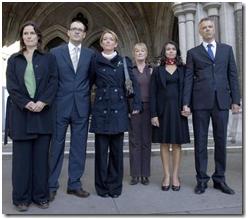
|
| Do you come here often? Will you be back? |
|
Shadowy forces, 17 December 2010 |
Shadowy forces The Blacksmith Bureau
Posted by John Blacksmith at 14:41
Friday, 17 December 2010
There is only one consistent thread running through the three and a half year history of the Madeleine McCann case: the
"development", to use a buzz word, of the hypothesis that the child died in the apartment and that the parents disposed
of her remains with the possible assistance, active or passive, of some of the Tapas 7.
Suggestive evidence
for the case mounted steadily: the indications from the police statements that the holidaymakers were defensive rather than
forthcoming in their descriptions of May 3; the clear evidence of their collusion in drawing up a sequence of events on that
night; the weaknesses in the evidence of Jane Tanner, including her identification of Robert Murat as the abductor; the results
of the EVR dog searches; and the eventual refusal of the parents to co-operate in the investigation.
As we know,
however, all attempts to develop the suggestive indications into a prosecution case likely to achieve a conviction failed.
The Tapas 7 maintained a solid front and refused to return to Portugal to have their evidence tested; Jane Tanner was able
to avoid confirming or denying that she had identified Murat since the operation in which she did so was legally unauthorised;
the preliminary indications of the dogs were not backed up by unequivocal forensic evidence; once away from Portugal the parents
moved from non-co-operation to building up a powerful defence case exploiting the weaknesses in the evidence.
Despite
much noise this absence of a prosecutable case is not a matter of dispute. The Portuguese prosecutor produced an incoherent
summary of the case which was maddening in its lack of intellectual or legal rigour and which skated over the failures of
co-operation by the Nine; nevertheless it is overwhelmingly clear that the failure to turn the suggestive evidence into a
compelling legal case doomed all chances of prosecution. That remains the case today.
Goncalo Amaral himself accepts
that, at the time of his removal from the investigation, the evidence was insufficient, adding that when he was taken off
the case he was about to fill in some decisive gaps, particularly in the vexed matter of how the body of the child could have
been hidden. Perhaps he was, but that is speculation, not evidence.
Amaral has been admirably consistent until
recently in his attempts to keep the focus on the activities of the Nine, in particular by encouraging a movement to get the
Tapas 7 back to Portugal to clarify their activities on May 3, the one absolutely glaring example of a failure to provide
information to the investigation. Compared with this lead, which the prosecutor himself admitted was completely unexplored,
all of the supposed leads followed up by the parents and their private detectives are insignificant.
So there we
have it. The focus has narrowed to the one gaping hole in the investigation.
One would have thought that the next
question was how can we move to fill that gap? How can we persuade these key figures to co-operate voluntarily in the interests
of truth? Are there intermediaries trusted by both sides who could actually talk to the seven? Do they even accept that they
have a contribution to make? Should the question of immunity be pursued? What would the McCanns like the seven to do? Could
they be called in a libel case?
For some reason, however, since the Portuguese appeal court ruling which, among
other things, attested to the validity of the Amaral hypothesis or interpretation, the focus has become blurred, as the reaction
in Portugal to the ambassador's cable has highlighted.
From the UK it looks weird. The Amaral hypothesis –
which concentrates on investigating the actions of nine people - is suddenly drowning in a welter of theories which seemingly
concentrate on everything but the Nine: governments, states, secret services, secret co-operation between Britain and America
at Portugal’s expense. What is going on?
Inasmuch as there is any coherent theory behind the claims being
seriously put forward by Portuguese commentators and their supporters - and of course the claims are infinitely flexible -
it appears to be this.
The McCanns had government protection due to their shadowy but powerful influence with key
figures in the equally shadowy corridors of power within the British Establishment. There was what Alfred Hitchcock called
a MacGuffin – something utterly secret but uniting the forces of evil – that had to be protected and covered
up.
The British ambassador, representative of the Establishment, moved quickly to start influencing the investigation
and influential figures, including Dodd and the Machiavellian power-broker Mitchell, were dispatched to make sure that nothing
leaked out to the assembled world media.
Despite these powerful forces the Portuguese police established a case
but just as Goncalo Amaral was about to put the final brick in the wall and bring the pair down the secret forces struck.
The Portuguese authorities, playthings in the tentacles of the British Empire and acting under the direct command of the evil
Gordon Brown removed him from the case.
The forensic results confirming the dogs' searches, which had already
been communicated verbally to GA, were changed by the FSS. The UK press were DA-noted into silence. A decision was taken at
the end of September 2007 to bring in a figurehead, a "clean-up lady", to wind up the investigation and ensure that
the McCanns went free. As always in this sort of world the plans were executed with flawless precision.
As far
as assessing this theory there is little worth saying except that if it is true then all hopes of clarifying the Madeleine
McCann affair are doomed: clearly the forces are so powerful that they will stop at nothing, including, presumably, killing
off anyone who gets too close. So goodbye to that.
Of course we are only hearing from a minority of the Portuguese,
not the large majority who seem unexercised by the affair and who, one suspects, have a less Manichean view of the world.
Certainly my own experience of friendships within the sizable London Portuguese community has been of level-headed realists,
comfortable within their adopted society.
But the voices that we do hear in the Portuguese media seem to call out
from a simply terrifying world, a world of shadowy interests in which ordinary citizens have no power, in which virtually
everyone can be bullied and corrupted, that has no legal system worth defending and, most of all, is one in which "they"
will always get their own way against little "us". Who would live in such a society except helpless victims?
I do not know Portuguese society. Portuguese friends have told me that there is, as yet, a lack of belief in democratic
institutions, a feeling that personal contact and influence are still the best way to get things done. I do know that the
portrait the Portuguese television commentators paint of British capabilities and the power of British politicians is simply
bizarre. As for the power attributed to nine provincial nonentities from the medical world...
In their rogatory
interviews and their responses to Rebelo regarding returning to Portugal for the reconstruction some of the seven expressed
concern that, whatever they said and did, the Portuguese would twist their responses. They were going on their experiences
with the Portuguese media. If the commentators now talking of the "evidence withheld by the British" etc are typical
then might they not be justified in their claimed worries? Would they be in the hands of realists or fantasists? And is that
going to help get them to co-operate?
|
Another year gone, 23 December 2010 |
Another year gone The Blacksmith Bureau
Posted by John Blacksmith at 01:16
Thursday, 23 December 2010
When we launched this blog a year ago one of our main aims was to do anything we could to help expose and dismantle
the parents' fib 'n' spin machine which we've called Team McCann.
We don't know what happened
on May 3 2007 and we wish we shared all the certainties about guilt or innocence of the parents so prominently on display
elsewhere. The systematically dishonest activities of the machine set up by Kate and Gerry McCann to lie and spin to the public,on
the the other hand, are not a matter of conjecture or imagination but of clearly established fact. We hope that the evidence
of its workings we have laid out here over the past twelve months has helped others to perceive the reality.
In
any case the machine is now in terminal decay. Was it only a year ago that Kate McCann made her royal progress to Portugal?
That was before the full horror of Goncalo Amaral's defence case hit the airwaves and all the carefully contrived Team
initiatives and responses of previous years finally vanished, with Mitchell suddenly silent for want of instructions and the
parents lurking, speechless, behind closed curtains in Rothley, as they had done after their flight from Portugal in 2007.
And when the parents did eventually regain the power of speech things were utterly changed. The press corps assembled
on the Lisbon court steps watched in amazement as the dignified heart consultant Dr McCann, the besuited figure who had lectured
the House of Commons, was abruptly transformed into the repulsive, spitting Gerry "Hyde" McCann, snarling at the
media with foam flecks on his lips. Just for an unguarded few minutes all the posing was gone, revealing someone who, as a
commentator observed, looked capable of absolutely anything.
Even so, when Kate McCann came to give her
confident Christmas message to her subjects last year, she was able to refer merely to "some people" not sharing
their objectives.
The latest Christmas update has an altogether different tone. It is one of pessimistic resentment
– not at kidnappers or gypsy paedophile rings but at the "injustices" that she and her husband have been subjected
to and at those who "compound" their suffering.
It is, perhaps, unfair to say it but in speaking of their
resentment at the way they have been treated, rather than the treatment of their daughter, Kate McCann sounds for
the very first time as if she might mean what she's saying. Until now three and a half years of blogs and website updates
– not to mention the seriously disturbing "diary" extracts - have consistently shown a pathological separation
between the emotions the pair claim to feel and the actual tone of the entries, which have all the emotional conviction of
a dead fish falling onto a slab. This time there's a bit of feeling.
Now it may be that until recently Kate
McCann has been suffering from a genuine problem involving a total inability to express real feelings or possibly even experience
them. And that it is this strange condition - needing treatment? - that also accounts for the robotic, droning nature of her
pronouncements in screened interviews, so reminiscent of a programmed Bladerunner replicant. Apart, that is, from
recent flashes of anger – usually at Amaral – that bring about a semblance of animation.
As we've
said before it is just possible that the pair have become so utterly and completely disturbed since their child's disappearance
that even though they're innocent they convince virtually everyone who investigates them that they are as guilty as hell
of something, because in almost every word they utter, and however hard they try to be "normal", they come
across all wrong. That would be a strange irony, wouldn't it – to be eternal but innocent suspects because
something vital inside them had died with the loss of their child?
But is that credible? Their apparent emotional
deadness is hard to reconcile with their enthusiastic manipulation of the emotions of others via Mitchell and the spin team.
And friends and family describe no radical change in their personalities since May 3. So most of us are thrown back on the
simpler explanation, one that is perfectly consistent with their spin machine activities: yes, emotionally there is
something missing but yes too, they are acting, for whatever reason. Except when they're angry.
Still, with the slow disintegration of the team over the past year and the apparent death of their hopes that the
accusations against them will one day be forgotten, they are forced to speak more and more for themselves rather than skulking
in the background while others project their words, lies and "feelings" for them. So perhaps we will learn more
in the future.
With their agitated response to the Wikicable the year ends, as it began, with the pair on the defensive,
unpredictable, scenting danger and betrayal. Sometimes it seems that all the participants in this bizarre affair are steadily
losing their marbles.
|
No, sorry, 24 January 2011 |
|

|
| Caravaggio's The Conversion of St Paul |
Posted by By John Blacksmith at 17:43
Monday, 24 January 2011
OK, the Bureau has rubbished some of the claims of Portuguese journalists about UK politics and is gradually coming
to the conclusion that the whole UK conspiracy thing rests on terrible, if understandable, self-delusion; and OK, we've
been worried by Goncalo Amaral's apparent determination to widen the number of his enemies rather than concentrating his
fire on the nine who already hate him.
But change our view of the McCanns and their behaviour since May 3 2007?
See the light and repent? Forget it. No reinterpretations, no misgivings and no Damascene conversion.
Repeating
what we've said before so many times may be boring but it doesn't make it any less true, despite the official McCann
view about "old stuff" or their spokesman's assessment that a Wikileaks cable is of no value because it is "an
entirely historic note".We don't know what happened on May 3: our source of information is what has happened since.
And the case remains simple: the disparity between what the parents have claimed and what we see for ourselves
in the records and in their actions. Whether they have "operational" reasons (after nearly four years!) for
masking their own actions with spin and misinformation, whether they are damaged, whether they are incapable of seeing the
difference between truth and fiction, or whether they are simply pathological liars, the net result is the same: they are
not reliable, credible, truthful witnesses.
Yet they are the only witnesses to claim direct evidence of
abduction via the state of their apartment etc on May 3. Their unsupported testimony is the foundation of the abduction case.
But why should their statements about what they saw that night be any more truthful than what they have said on so many matters
since? Well, why?
Or, conversely, if Kate and Gerry McCann had shown themselves to be pretty frank and
open over the last few years, both with the police and with the public, then, whatever the claims of Goncalo Amaral and others
of like mind, our attitude would be completely different.
It all begins with lies.
Jondipaolo for Sky news tweeting the court proceedings in Lisbon in real time:
"Mr Menezes [the
prosecutor and author of the archiving report – no enemy of the parents] said that a claim made by the McCanns
on the first day after Madeleine's disappearance was not true.
The witness said that Kate and Gerry's report
that they had been checking on their daughter every half an hour was inaccurate.
He claimed that although the parents
had been checking on Madeleine, it was not as often as every 30 minutes."
It continues untruthfully
with a string of claims that were either in irreconcilable conflict with statements by others or contradicted by their own
actions – "we are fully co-operating with the investigation" (see Anjos for refutation, see records
for refusal to answer the arguido questions), "we will remain in Portugal," (see flight) "we will
return to Portugal when required", (see retention of UK's leading extradition defence lawyers).
And it ends with evasion:
"Nevertheless," said the same Mr
Menezes in the famous archiving report prior to the shelving of the case, describing the attempts to get the parents and their
friends to attend a reconstruction, "despite national authorities undertaking all measures to render their trip to Portugal
practical and endeavouring to answer the many doubts that they raised about the necessity and timing of their trip, they chose
not to attend for reasons unknown, thus rendering the reconstruction unviable." [our translation]
That's
the case – in skeletal form and leaving out a host of similar examples – against accepting the parents' word
about anything connected with the disappearance of their child.
Ah, say our friends of a different persuasion,
those examples may be true (maybe? maybe?) but that same prosecutor used his famous words at the end of the report
to, ahem, "clear" them. It's all over.
But it clearly isn't all over. And for the last words
on the question of whether we should ignore the firm evidence of the McCanns' words and actions since May 3 and gaily
forget the whole case and leave these poor parents alone we have another – less frequently quoted – passage from
the archiving despatch regarding the importance of the aborted reconstruction:
Amongst other things it was necessary
"...in order to form as firm a conviction as possible about what was seen by Jane Tanner and the others involved and,
eventually, to dismiss once and for all any doubts that may subsist concerning the innocence of the missing child's
parents."
And that's it, isn't it? In the same despatch that "clears" the parents in
the Portuguese judicial sense Mr Menezes, the gentleman who testifies to their lying about the most significant evidence of
all – their movements on the night of May 3 between 8.30 and 10 PM – formally confirms what we all know in words
that his Attorney-General allowed to stand: that they failed to dismiss the doubts about their innocence.
Quite. And the doubts remain today. And will continue to do so until the parents and their seven friends collaborate with
the Portuguese police to dismiss those doubts. Who knows, the effort might even help them find their daughter.
|
So now..., 09 February 2011 |
So now... The Blacksmith Bureau
Posted by John Blacksmith at 17:01
Wednesday, 09 February 2011
So
the Bureau retires from the fray. The case has hurt many people – the Healy and McCann families, a number of
the police officers involved, Robert Murat. Reputations have been damaged or smeared, including those of ambassadors, civil
servants and the entire Portuguese justice system.
Mark Warner paid for being at the centre of the affair by being
effectively destroyed, its remnants sold. At one stage the oldest alliance itself was rocked as the media turned the case
into a suppurating ulcer between the two countries. The head of the PJ had to go, Goncalo Amaral lost his post before resigning
to write a book that has led him into a legal labyrinth; Metodo, the private investigators brought in to find the child, were
exposed and ridiculed; another of the McCanns' supposed investigators lies in prison awaiting extradition to the United
States.
Against this loss and destruction can be set those who have gained handsomely by the case, chiefly the
media and the numerous beneficiaries, professional and otherwise, of the Madeleine Fund; overall, however, the picture is
a sombre and unpleasant, even sordid, one.
The internet reflects this reality. The Madeleine McCann affair was
the first internet crime story, the sole source of information free from national media self-deception and the repository
of gigantic amounts of relevant data unavailable elsewhere. Unfortunately its weaknesses have emerged almost equal to its
strengths. The author's own first experience of the former was in joining, for a short time, a site called physics.org.
I was taken aback to discover that once on the net all principles of scientific debate were abandoned in favour of the new
web staple, contempt and screamed abuse. If academic scientists could fall out and hurl insults at each over basic equations,
for Christ's sake, then the future for reasoned debate on the web was clearly dodgy. So it has proved.
Now,
what justification was there for me or anyone else continuing to write about the case, particularly the parents' place
in it, after it was archived? The answer lies in the way it was shelved. Far from concluding the affair it laid the grounds
for unending dissension.
According to the Portuguese prosecutors' report, which terminated the active investigation
and released the three arguidos from their suspect status in July 2008, the Madeleine McCann case began thus:
"On
May 3 2007 at around 10PM Kate Healy headed for apartment G5A in the Praia da Luz Ocean Club to check on her three children
who had been left asleep while she, her husband Gerald and friends dined at the nearby Tapas restaurant. The whole group had
been following a similar checking routine although the frequency of the checks has not been rigorously established."
Or, if you like the commonly used but rather incoherent translation to be found on the McCann Files website:
"On the 3rd of May 2007, at around 10 p.m., at the Ocean Club, in Praia da Luz, Kate Healy – like her, her husband
Gerald and their friends, while dining at the Tapas, did with a periodicity that has not been rigorously established –
headed for apartment G5A, in order to check on her three children, who had been left there, asleep."
The report
concluded by releasing the McCanns, along with Robert Murat, from their "arguido", or uncharged suspect, status
on the grounds that there was no evidence of any crime by them under the relevant sections of the penal code.
The
parents and their lawyers took this is, and its amplification for the media by the Attorney-General's office, as an official
exoneration from any suspicion of personal involvement in the disappearance of their child, one to put all doubts about them
finally to rest.
It couldn't be done, either in the legal sense or in the field of public debate. As to the
former the UK media immediately accepted the report as an insuperable obstacle to a defence to libel claims and any doubts
about the parents' role ceased to be expressed. In Portugal, on the other hand, its legal status remains undetermined,
though damaged, while the various cases involving the parents and the ex-police officer Goncalo Amaral make their slow progress
through the courts.
The problem preventing any "closure" of public debate about the case lies in the
ambiguous, not to say schizophrenic, nature of the prosecutors' report.
Why?
Because the prosecutors'
conclusions at the end of the report do not flow directly from the evidence summarised there – as by Portuguese law
they are meant to do - but are partially superimposed upon it: hence the schizophrenia.
In the summary of the case
material provided to them by the PJ it is made clear that the investigation is incomplete. Not incomplete in the sense that
there is no trail to the whereabouts of the child to be followed, but in the sense that there are witnesses who have still
not fully deposed, who have not fully co-operated and whose information cannot be taken as reliable in its incomplete state.
And these witnesses, the parents and their seven friends, are not peripheral, or anything like it: they include, in
particular, the five people who were in or around the crime scene on the evening of May 3, one of whom was the last person
known to have seen Madeleine McCann alive. Such information as exists about the last hours of the child in Praia da Luz comes
from them and yet those witnesses, having left Portugal, all refused to return to assist the investigation in clarifying
their evidence about events that night.
Further, their testimony was not just incomplete: parts of it, the critical
parts involving the last hours and the checks on the the children, the heart of the whole case, were untrue.
So we return to the words of the prosecutors at the head of this article: "with a periodicity that has not been
rigorously established." That seems to mean that after seventeen volumes of investigative material and fourteen months
of enquiry the authorities hadn't even been able to fix the movements of the key witnesses that evening, and that the
two arguidos whom they were preparing to release from suspect status had lied to the investigation.
If that was
so then clearly shelving was premature or inappropriate: releasing the two arguidos from suspicion while the grounds for suspicion
remained was Alice in Wonderland justice, apparently rewarding the pair for having fled Portugal. So is that what
"periodicity that has not been rigorously established" means? That the parents were lying?
Yes. Buried
in the rest of the report is the confirmation:
"It is extracted from the files that the McCanns and their
friends checked to verify if all was well with their children, as can be concluded from what the members of this group declared,
and also derives from the testimony of Jerónimo Tomás Rodrigues Salceda, a waiter at the Tapas, who stated that
he "noticed, because it was evident, that some of the group's members sometimes went outside of the restaurant to
do something, which by and by he realised was to "check" on the children. Nevertheless, he was always convinced
that those children were in a space that belonged to the Luz Ocean Club… Nevertheless, it can also be concluded from
the files that this surveillance with the periodicity that was mentioned above was not the one that is alleged
in the files, which leaves unexplained why, on that night, the procedures were altered in the sense of reducing
the checking intervals."
And:
"Pamela Fenn, who resides on the residential block's first
floor, above the apartment that was occupied by the McCann family, clarified that on the 1st of May 2007, two days before
her disappearance, at around 10.30 p.m., she heard a child crying, which from the sound would be Madeleine and that she cried
for an hour and fifteen minutes, until her parents arrived, at around 11.57 p.m.
This shows that the parents were
not persistently worried about their children [and] that they didn't check on them like they afterwards declared
they did, rather neglecting their duty to guard those same children, although not in a reckless or gross, manner."
And, in one of the very few genuine developments in the case since July 2008 one of the prosecutors, José de
Magalhães e Menezes, giving evidence in the Lisbon court case, removed any doubt: the group, he said, had
not been telling the truth about the frequency of their checks – they had checked, he said, but not at
the intervals they claimed.
Mr Menezes, as we shall call him, is an easy figure to mock so it might be unfair to
point out that if the group were the only people testifying to the checking on May 3 and it is established that they were
not truthful in their statements, then his acceptance that checking did take place that night is based purely on
the statement of one waiter, the above-mentioned Jerónimo Tomás Rodrigues Salceda.
But Salceda, by
his own admission, knew nothing first hand of any checking, only ("some of the group's members sometimes went
outside of the restaurant to do something") that some members of the group left the restaurant at intervals, destination
unknown.
In the judicial context the judges hearing Amaral's appeal recognised this schizophrenic disjunction
between the prosecutors' conclusions and the evidence from which those conclusions were supposedly derived. Had the McCanns'
defence team been successful in their attempt to exclude the DVD containing the evidence from the case the judges' examination
of the report would have been delayed, perhaps excluded. As it was the judges were able to consult the DVD case papers for
themselves and compare the the raw material of the case, including the wildly divergent statements that the group made about
the frequency of the checks, with the Menezes selection.
Having looked at the evidence the appeal judges determined
that the archiving report's conclusion could not be taken as a definitive expression of the case evidence; it
was, they said, "an interpretation", not a finding of fact, thus re-opening the entire can of worms going back to
May 3.
So much for the legal context and the overturning of the doomed attempt to maintain the report's "last
word" status. And in the extra-judicial public arena this lamentable report has had equally little acceptance as drawing
a line and stilling the "doubts".
The UK media is indeed silent but the parents remain in a limbo between
public acceptance and public suspicion, an unstable state based on indifference and boredom with the case liable to ignition
into active hostility should new facts emerge.
People will always ask questions about unsolved mysteries. As long
as Kate and Gerry McCann and their seven friends refuse to answer the charges of untruthfulness and unwillingness to co-operate
with the investigation then the parents, their friends and their children will never have peace and there will be those who
believe they deliberately helped it to fail.
That's it, that's my lot.
Comment:
If the section of the archiving report reproduced in this piece apppears 'incoherent', it is due to the inherent differences
in syntax between the two languages and the formal nature of the report. The translation, as presented on this site, is not
an interpretation of what the Portuguese prosecutor intended to say, it is a faithful and literal translation of that which
is actually written.
|
|



























